









By Adam Reinherz | Senior Sta Writer
Navigating icy roads is one reminder that winter is really here. The calendar is another indicator that 2024 is over. As Pittsburghers prepare for a season of cold while dreaming of warm sunny days, the time has come to look back on the year that was.
During the past 12 months, war in Israel continued. Even from 6,000 miles away, Pittsburghers paid close attention to events in and around the Jewish state. Readers turned to this publication for details and perspectives. And while Israel remained a primary focus for readers, local events also stirred attention.
The top local stories of 2024, as determined by digital views, reflect a readership committed to learning more about Israel, Pittsburgh and the Jewish world.
Here’s a look at the top local stories of 2024:
1. I watched footage taken on Oct. 7. What I saw was evil.
Chronicle Senior Staff writer David Rullo was among a group of nearly two dozen local leaders invited to Rodef Shalom Congregation for a screening of unedited footage of Hamas’ Oct. 7, 2023, attacks in Israel. Rullo’s first-person piece described the horrors depicted on screen and his own reaction to viewing the terror. The story isn’t
an easy read, but it’s a valuable one — which is why Chronicle readers made it their top local story of 2024.
2. New kosher restaurant in Squirrel Hill will serve shawarma, falafel and some memories
When word of a new kosher eatery arrived, potential customers devoured the news. Alas, the restaurant never came to be. In its place remains this piece, and dreams of a potential shawarma stand someday delighting kosher consumers in Squirrel Hill.
3. Local co ee shop takes steps to make amends for antisemitic act of barista
After a server at 61C Café in Squirrel Hill wrote “Free Palestine” on the lids of beverage cups of one adult and three teens who were speaking Hebrew, the shop’s manager said he was “disappointed” and “embarrassed” by the employee’s act. After meeting with Julie Paris, regional director of StandWithUs Mid-Atlantic, one of the café’s owners issued a statement to the Chronicle. Included within the statement was an admission of wrongdoing and a desire for better behavior: “We will not tolerate any forms of discrimination or hate speech, and will ensure that nothing like this ever happens again. The café feels
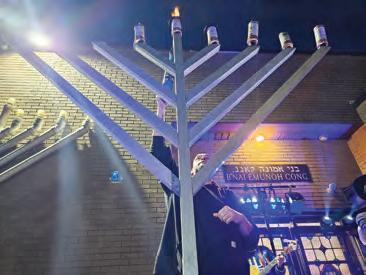
By David Rullo | Senior Sta Writer
The lights of Chanukah shone bright in Greenfield during the holiday’s fifth night.
Hundreds — including politicians, rabbis and members of the Pittsburgh Jewish community —danced, sang, ate and celebrated on Murray Avenue in front of B’nai Emunah Chabad on Dec. 29.
Organized by Chabad of Greenfield, the night’s festivities began with a menorah parade that included a procession of cars and students from the Yeshiva Schools of Pittsburgh, and a Tesla Cybertruck topped with a menorah.
This was the first year Pittsburgh Mayor Ed Gainey participated in the annual event. He was invited by Chabad of Greenfield Rabbi Yitzi Goldwasser.
“I believe we should celebrate culture,” Gainey told the Chronicle. “It’s culture that makes the city go around, and the truth is the more we understand one another’s culture, the more understanding we have




By Adam Reinherz | Senior Staff Writer
Stopping the sun is a rare feat. Harnessing its power is a bit more manageable.
Across western Pennsylvania, several synagogues are exploring the latter in hopes of reducing costs and greening operations.
Beth El Congregation of the South Hills is beginning work on a solar panel-related project. The suburban synagogue was recently named one of seven nationwide recipients of a grant from Jewish Solar Challenge. The organization, which provides financial support for solar panel installation, announced that Beth El was among those to split a sum totaling $318,000.
According to JSC, five awardees received a maximum $50,000 matching grant.
Beth El representatives declined to disclose the amount received; instead, they described their pleasure of being included among recipients.
“We are thrilled,” Lynda Abraham-Braff, Beth El’s president, said. “A lot of work went into this.”
Chris Benton, the congregation’s executive director, agreed, and said the solar panels are “part of an ongoing initiative” to green the building.
Nearly two miles down the road from Beth El, Temple Emanuel of South Hills is beginning a similar project.
For months, Temple Emanuel’s Senior Rabbi Aaron Meyer has assisted lay leaders in exploring and finalizing greening initiatives.
“We are under contract to install a 250,000 kilowatt hour system, which is the equivalent of 25 average family homes per year, that will offset 87% of Temple’s annual electricity

costs,” Meyer said. Installation requires an upfront cost of about $450,000; once that sum is covered, however, the panels are “expected to continue producing up to 85% of their original capacity and generate $1.4 million or more for the organization.”
Meyer sees the move to solar as not only fiscally savvy but aligning with several Jewish values, including bal tashchit (do not destroy) and l’avda ul’shamra (to till it and to tend it).
The two eco-friendly concepts derive from the Torah.
Deuteronomy 20:19 notes that if, when laying siege to a city, the endeavor takes a prolonged period of time, “you must not destroy its trees…you may eat of them, but you must not cut them down.” The following verse continues the theme by clarifying that only non-food bearing trees may be destroyed.
Rabbinic literature affords myriad explanations for the ordinances, but Meyer sees a tie-in to the Torah’s imperative to protect the earth.
Genesis 2:15 states that God took the man and put him in the Garden of Eden “to till it
“I think that we have an obligation to be part of the world, and to ensure that we leave it for future generations in a way at least as good as we found it,” Meyer said.
That responsibility stems from a partnership referenced by the first biblical verses, he continued.
Genesis 2:7 employs similar Hebrew words ( ha’adam and ha’adamah ) when noting that God formed the man from the dust of the ground.
For millennia, rabbinic literature has stressed the ethical responsibility of conservation, Meyer said.
Kohelet Rabbah, an aggadic interpretation of Ecclesiastes compiled around the 7th century, states that after God created the first human, “He took him and showed him all the trees in the Garden of Eden, and He said to him: ‘See My creations, how beautiful and exemplary they are. Everything I created, I created for you. Make certain that you do not ruin and destroy My world, for if you destroy it, there will be no one to mend it after you.”
Congregations can make multiple

SUBSCRIPTIONS
subscriptions@pittsburghjewishchronicle.org
412-687-1000, ext. 2
TO ADVERTISE advertising@pittsburghjewishchronicle.org 412-687-1000, ext. 1
EDITORIAL DEPARTMENT
Email: newsdesk@pittsburghjewishchronicle.org
BOARD OF TRUSTEES
Evan H. Stein, Board Chair
Gayle R. Kraut, Secretary
Evan Indianer, Immediate Past Chair
Gail Childs, Dan Droz, Malke Steinfeld Frank, Seth Glick, Tammy Hepps, Judith Kanal, Cátia Kossovsky, Charles Saul, Derek Smith
GENERAL COUNSEL
Stuart R. Kaplan, Esq.
Jim Busis, CEO and Publisher 412-228-4690 jbusis@pittsburghjewishchronicle.org
EDITORIAL
Toby Tabachnick, Editor 412-228-4577 ttabachnick@pittsburghjewishchronicle.org
Jarrad Saffren, Contributing Editor
Adam Reinherz, Senior Staff Writer 412-687-1000 areinherz@pittsburghjewishchronicle.org
David Rullo, Senior Staff Writer 412-687-1000 drullo@pittsburghjewishchronicle.org
ADVERTISING
Amy Weiss, Account Executive (412) 613-0697 aweiss@pittsburghjewishchronicle.org
PRODUCTION
Jeni Mann Tough
Production Manager
Carl Weigel
Art/Production Coordinator
Subscriptions subscriptions@pittsburghjewishchronicle.org 412-687-1000, ext. 2
Published every Friday by the Pittsburgh Jewish Publication and Education Foundation 5915 Beacon St., 5th Floor Pittsburgh, PA 15217
Phone: 412-687-1000
POSTMASTER:
Send address change to PITTSBURGH JEWISH CHRONICLE, 5915 BEACON ST., 5TH FLOOR PITTSBURGH, PA 15217 (PERIODICAL RATE POSTAGE PAID AT PITTSBURGH, PA AND AT ADDITIONAL MAILING OFFICES) USPS 582-740

arguments for installing solar panels or adopting other eco-friendly projects, and for Temple Emanuel, “We do see it as an expression of our Jewish values,” but there’s another rationale, Meyer said. “I think there’s also a tremendous educational opportunity.”
After the solar panels are installed, a screen will be placed near the synagogue’s entrance.
“Anyone coming into Temple will be able to see the panels in action and think about how they might take similar steps in their own homes,” Meyer said.
Robert Gleiberman, executive director of Congregation Beth Shalom, said he’s happy that the Squirrel Hill-based synagogue installed solar panels in 2021.
“They are a wonderful thing to have, to be more green and to do our part in the community and the world,” he said.
Beth Shalom undertook the eco-friendly project in tandem with fixing its leaky roof. At the time, costs for the panels and installation ran about $240,000.
Switching to solar was a way of curbing energy expenses that climbed to nearly $70,000 per year, former board member Bruce Rollman previously told the Chronicle. Gleiberman recently ran the numbers.
“As far as saving money on power, we know that we are,” he said. “We don’t really know how much that is. We just know that we’re saving money.”
Several factors — including fluctuating energy prices — make the math a bit cloudy. The clearer point is Beth Shalom’s take on solar panels, he continued. “We’re happy to have them. And we’re going to explore, in the future, spots in the building where we can add more.” PJC
Adam Reinherz can be reached at areinherz@pittsburghjewishchronicle.org.
Manuscripts, letters, documents and photographs sent to the Pittsburgh Jewish Chronicle become the property of this publication, which is not responsible for the return or loss of such items.
The Pittsburgh Jewish Chronicle does not endorse the goods or services advertised or covered in its pages and makes no representation to the kashrut of food products and services in said advertising or articles. The publisher is not liable for damages if, for any reason whatsoever, he fails to publish an advertisement or for any error in an advertisement. Acceptance of advertisers and of ad copy is subject to the publisher’s approval. The Pittsburgh Jewish Chronicle is not responsible if ads violate applicable laws and the advertiser will indemnify, hold harmless and defend the Pittsburgh Jewish Chronicle from all claims made by governmental agencies and consumers for any reason based on ads appearing in the Pittsburgh Jewish Chronicle

By David Rullo | Senior Staff Writer
So much for Chrismukkah.
Anyone hoping to publicly celebrate the convergence of Chanukah along side Christmas had to do so in a South Hills neighborhood that wasn’t Mt. Lebanon.
That’s because for at least the third year in a row, the attempts by Chabad of the South Hills to bring Chanukah’s lights to the town ship were quashed by public officials.
“We wanted to do a Chanukah menorah parade with our cars last year,” Chabad Rabbi Mendy Rosenblum recounted. “We actually got approved, and then at the last minute, even though the police department had approved it, the township hadn’t known about it and when they learned of it, imme diately canceled it.”
At issue was the need for Mt. Lebanon police to halt traffic and the ability of the parade to proceed without stopping for traffic lights and stop signs.
In an email exchange that began in November 2023, Municipal Manager Keith McGill said one of the township’s concerns was that the event, if allowed, would set a precedent for other groups to request the same police escort.
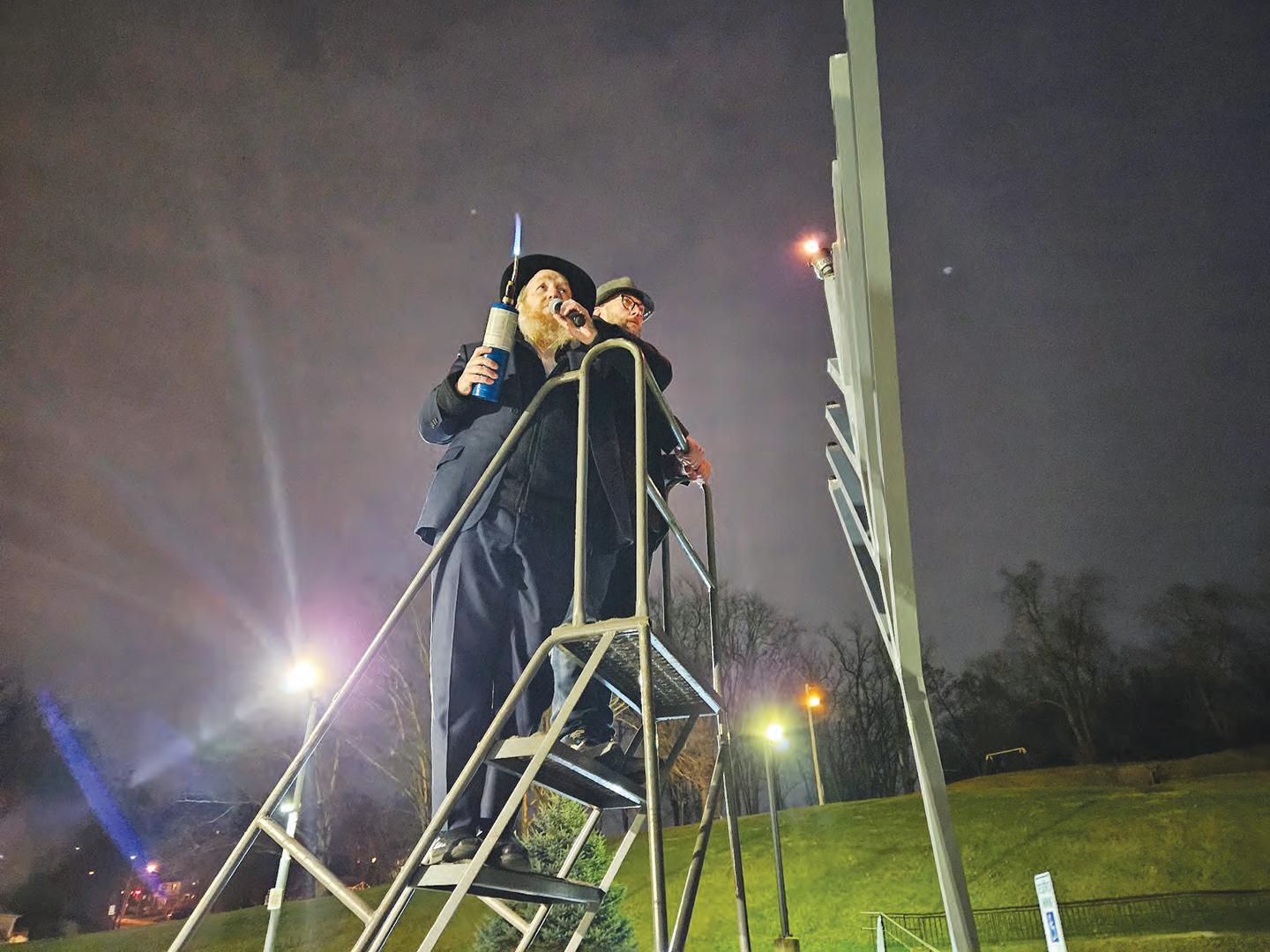
“We are not inclined to do so,” McGill said in the email, which was obtained by the Chronicle.
He said that while township leaders understand, appreciate and support the desire to spread goodwill and holiday cheer to people of all faiths, it couldn’t make value judgments on the “underlying message being promoted in a parade in determining whether to allow it or not.”
An organized procession, McGill stressed, is not prohibited, but would have to be conducted in compliance with all traffic laws.
“I am not ignorant on how that might affect a procession,” he wrote.
The email exchange also touched on Chabad’s request to erect a menorah, similar to ones displayed in Dormont and neighboring Washington County. Chabad hoped to have the Chanukah symbol represented in a prominent location in Mt. Lebanon, perhaps where the township was holding other holiday events or was displaying a Christmas tree and representation of Santa Claus.
McGill wrote that the township’s Beverly Brite Nite event and its Washington Road Winter Market were intended to promote the respective business districts, not a holiday.
He appeared to take umbrage with Rosenblum’s suggestion that those events included religious displays.
“I am not familiar with any reference in the bible to a Christmas tree or Santa Claus, which in my opinion are secular,” McGill wrote. “It is also my understanding that a Menorah is a religious symbol.”
McGill said that Mt. Lebanon’s solicitor, Philip Weis, informed the township that there is a distinction between municipal events and events run by third parties.
Attempts to construct a public menorah in Mt. Lebanon go back to at least 2022.
In another email exchange, Eric Milliron, the township’s commercial districts manager, told Rabbi Levi Rosenblum of Chabad of the South Hills that a public menorah would not be allowed.
“I have been informed that we do not host any religious oriented displays on Municipal property,” Milliron wrote.
Instead of using public property on Washington Road where the township holds its holiday celebration, he suggested Chabad find a community partner, perhaps the Unitarian Universalist Church of the South Hills, located much further down the road and outside the neighborhood’s business district, or Reform congregation Temple Emanuel of South Hills on Bower Hill Road.
“I am sure that this is not the response you had hoped for, but I truly hope you can find a location for the display,” Milliron wrote.
At that time, Levi Rosenblum questioned the township’s Christmas tree display and was told by Milliron that, according to Weis, that display was secular and therefore permitted.
In another email exchange this year, Mt. Lebanon Commissioner Jeff Siegler told Mendy Rosenblum that the township did not approve a request for a public menorah in 2023 because it “did not wish to, nor did it, create a public forum or limited public forum open to third party expression.”
Mendy Rosenblum told the Chronicle that he thinks Mt. Lebanon doesn’t want to open itself to a flurry of requests from third-party, private institutions.
“They don’t want to open Pandora’s box,” he said. “The problem is, they’ve already done that by doing a holiday celebration that’s really a Christmas celebration. Anyone that’s at that event will tell you that’s what they’re celebrating.”
of the same winter holiday season, which has attained a secular status in our society,” Justice Harry Andrew Blackmun wrote.
The issue was adjudicated a second time in 1989, when Pittsburgh’s then-Mayor Sophie Masloff decided to not erect the menorah. Chabad of Greater Pittsburgh filed suit alleging a violation of free speech. That case, too, went to the Supreme Court.
“The Supreme Court found that the denial of putting up the menorah was a violation of Chabad’s free speech rights,” said attorney Charles Saul, who represented Chabad in its fight. He is also representing Chabad of the South Hills. (Saul is also a Chronicle
Saul said that Mt. Lebanon’s arguments don’t hold much weight, especially in light of the fact that other third-party groups have had public displays in the township.
“They’ve already been inclusive,” Saul said. “They’ve been inclusive to everyone. They’ve just excluded Chabad and the
Even a compromise suggested by Saul and Rosenblum, which would have allowed Chabad to erect and light the menorah and then immediately take it down, was rejected by the township.
Mendy Rosenblum also questions the term “holiday celebration.”
“What holiday are they celebrating and why can’t a menorah be included?” he asked.
If this fight sounds familiar, it’s because the issue was already decided in 1989 — by the United States Supreme Court — in a case brought by the American Civil Liberties Union against Allegheny County for a holiday display that included a nativity scene, menorah and a salute to liberty.
The court ruled that while the creche violated the United States’ Constitution’s establishment clause — which prohibits the government from establishing a religion or favoring one religion over another — a menorah does not.
A “combined display with a Christmas tree and a sign saluting liberty does not impermissibly endorse both the Christian and Jewish faiths, but simply recognizes that both Christmas and Chanukah are part
“It’s a special disappointment,” Saul said, “that they do this at a time when there’s so much antisemitism around us. This would be a shot in the arm for the Jewish people of Mt. Lebanon to show that they’re included and that there’s support for the citizens in the community.”
Mendy Rosenblum is clear: He doesn’t think the township officials are antisemitic, but he noted that only a Jewish group has been excluded from having a parade or erecting a holiday symbol.
“It’s not enough to not be antisemitic in today’s society,” he said. “You have to show leadership. You can’t only do what’s convenient.”
And while Chabad of the South Hills hasn’t filed suit against the township yet, the organization is pondering next steps if its requests are denied again next year.
Keith McGill did not respond to requests for comment before press time. PJC
David Rullo can be reached at drullo@ pittsburghjewishchronicle.org.

By JNS
Pennsylvania Judge Scott Hardy released an opinion last week affirming that a discrimination lawsuit could proceed against Carnegie Mellon University, a private academic institution in Pittsburgh. Yael Canaan, a graduate of the school who is Jewish and has Israeli heritage, alleges numerous incidents of bigotry and a failure of administrators to properly respond to them.
The suit, filed by the Lawfare Project in 2023, describes an incident when Canaan presented her architecture project on May 5, 2022, to Mary-Lou Arscott, a professor and associate head for design fundamentals at the architecture school.
Canaan had created a model to depict a wire fence eruv — an enclosure used by

Orthodox Jews to permit certain activities not usually allowed on Shabbat, such as wheeling a stroller or carrying an object.
Arscott reportedly replied that “the wall in the model looked like the wall Israelis use to barricade Palestinians out of Israel,”

and that Canaan’s time would have been better spent on a project that focused on “what Jews do to make themselves such a hated group.”
The suit describes the steps Canaan took to address the statement and the lack of assistance
from the school’s administration to support her. One professor she reached out to for help, adjunct instructor Theodossis Issaias, allegedly lambasted her for “acting like a victim” and “calling all of us antisemites.” He allegedly said he was “not there to fight her battles for her” and that he “cannot be an advocate for the Jews.”
The suit states that Issaias showed hostility to Canaan in class, which other students noted, and gave her a low grade that prevented her from receiving an honors degree and put her scholarship at risk.
Hardy wrote in his opinion that “a careful examination of Ms. Canaan’s complaint reveals numerous factual averments that plausibly show that CMU intentionally discriminated against her through its deliberate indifference because she is Jewish and of Israeli descent.”
According to Hardy, “at this stage of the litigation, any reasonable inference that can be drawn from these factual allegations must, of course, be drawn in Ms. Canaan’s favor.” PJC
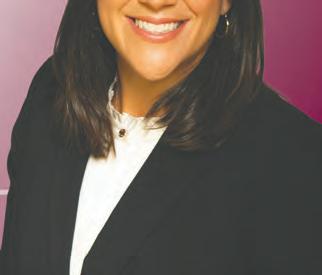













By Asaf Elia-Shalev | JTA
The Israeli government plans
But
proposed budget for 2025 also includes a massive new allocation: toward pro-Israel advocacy efforts abroad.
Under the new budget, Israel’s Foreign Ministry will receive $150 million, on top of what it gets for its existing activities, for what’s officially known as public diplomacy, or in Hebrew, hasbara. That sum is more than 20 times what such efforts have typically been allotted in past years.
The dramatic expenditure is the result of a political deal that Israeli Prime Minister Benjamin Netanyahu struck last month to
shore up his governing coalition. Politician Gideon Saar and his New Hope party agreed to rejoin the coalition in return for the funding and the appointment of Saar as Israel’s foreign minister.
The news comes as public opinion about Israel in the United States and elsewhere around the world has been intensely battered as a result of a war that has left the neighboring Gaza Strip in ruins with much of its population facing displacement, disease, and hunger.
Saar doesn’t have a detailed plan for how to spend the money yet, but at the time he signed the coalition agreement with Netanyahu, his office released a statement saying it would be used to influence sentiment in the foreign press and on social media.
Saar’s statement also said he foresees a focus on American college campuses, which
By Adam Reinherz | Senior Staff Writer
An evolving organization is altering its Pittsburgh presence. Jewish Fertility Foundation, a 10-year-old Atlantabased group, will no longer employ a local staffer to oversee its Pittsburgh operations. Instead, the organization has tapped Tamar Poupko Smith, a Cleveland resident with Pittsburgh ties, to serve as regional manager. Smith, whose late grandfather Rabbi Baruch Poupko served as Congregation Shaare Torah’s spiritual guide between 1942 and 1996, visited Pittsburgh on Dec. 17 to build rapport with local residents.
Inside Bunny Bakes on Murray Avenue, Smith spoke with several individuals before heading to UPMC to meet healthcare professionals.
“JFF is here to stay in Pittsburgh,” Smith said. “I’m here to support all potential clients, current clients and grantees, and to continue to support them through our financial grants and support programs.”

Since its inception, JFF has distributed 354 fertility grants (totaling $2.49 million in grants, loans and clinic discounts) to Jewish families experiencing medical infertility challenges in one of the organization’s nine nationwide communities: Atlanta, Birmingham, Cincinnati, Cleveland, Denver, Detroit, Pittsburgh, Tampa and Washington, D.C.
Among those who’ve received emotional and/or financial support, there’ve been 221 babies born, Smith said.
Seated beside Smith, JFF Director of Development Jenny Jones proudly flashed photos of newborns and told the Chronicle that requests for aid have ballooned nationwide.
In 2023, JFF provided fertility grants to 76 families totaling $305,750. One year later, the organization supported 129 families with fertility grants totaling $491,000.
There was a similar increase in Pittsburgh.
After arriving in western Pennsylvania in 2022, the organization distributed two grants totaling $5,000. In 2023, another two grants, totaling $12,500, were provided. In 2024, JFF delivered fertility grants to nine couples totaling $32,000.
Eligibility for JFF funding, which ranges between $1,000-$10,000, includes several requirements: at least one Jewish parent (Jewish from birth or conversion from any denomination); intention to raise the child Jewish; no smoking or drug use; and applicants may have up to one child already. Funding is not available to those seeking treatment due to either a vasectomy or bilateral tubal ligation.
After receiving a grant, funds can be used for intrauterine insemination or in vitro fertilization treatment. Grant decisions are generally made within two to four weeks after an application is received, but the process begins with a diagnosis from a reproductive endocrinologist, according to the organization.
In addition to meeting with local residents, Smith said she hoped to develop greater bonds with Pittsburgh health providers.
JFF has directed Pittsburghers to Shady Grove Fertility in Wexford and UPMCMagee Women’s Center for Fertility and Reproductive Endocrinology, according to the organization.
Shelly Parver, associate director of planning and impact at Jewish Federation of Greater Pittsburgh, met with Smith last week and praised her efforts as well as the organization’s move to a regional model.
When JFF arrived in Pittsburgh it was in “startup-growth mode,” with specific needs, such as local people building relationships with therapists, fertility clinics and the hospital systems, Parver said. Now that the organization has become “sort of like a midstream,” the priorities needed to change.
After coming to Pittsburgh in 2022, JFF
received $90,000 from Federation.
The last of that three-year seed grant, with annual allocations of $30,000, was recently distributed and runs through June 2025.
Once that period ends, JFF is eligible to receive additional funding, Parver said.
JFF has applied for another three-year grant, totaling $90,000, Jones said.
Federation’s grantmaking committee will review that request and make a recommendation to the board around February or March, Parver said.
JFF’s needs are growing, Jones stressed.
The World Health Organization estimates that one in six people of reproductive age experience infertility during their lifetime.
Among some demographics, rates are climbing.
The percentage of married women ages 15–44 who were infertile rose from 6.7% in 2011–2015 to 8.7% in 2015–2019,

according to the Centers for Disease Control and Prevention.
Access to high-quality family planning services, including fertility care, is among the “core elements of reproductive health,” WHO reported.
“The Jewish Fertility Foundation fills a need in the community, and it’s positioned to continue to do so with its new model,” Parver said.
Removing a local staffer and transitioning to a regional model does not preclude Pittsburghers from accessing JFF’s programs or services. Similarly, the decision does not ignore the sizable differences between the two communities, Smith explained.
Cleveland has about 80,000 Jewish residents, according to a 2011 population study commissioned by its Federation. Pittsburgh has about 30,000 fewer, according to a 2017 population study commissioned by Pittsburgh’s Federation.
Cleveland’s Federation announced last week that it raised a record $38,087,175 in its annual campaign. Pittsburgh’s Federation is set to raise $14.5 million in its annual campaign.
Smith said she’s well aware of the differences between the two Rust Belt locales.
After speaking with local residents and visiting her grandparents’ former Squirrel Hill home, Smith said plenty of details distinguish Cleveland from Pittsburgh — access to fertility care shouldn’t be one of them.
“These are two totally different communities, but in both communities are families who are on family-building journeys,” she said. “The needs are the same, the details are different, but I think that’s why I’m here: just to figure these things out.” PJC
Adam Reinherz can be reached at areinherz@pittsburghjewishchronicle.org.
Submit calendar items on the Chronicle’s website, pittsburghjewishchronicle.org. Submissions also will be included in print. Events will run in the print edition beginning one month prior to the date as space allows. The deadline for submissions is Friday, noon.
SATURDAY, JAN. 4
Families with young children are invited to spend Shabbat morning with Rodef Shalom at Shabbat with You. Drop in for a light breakfast, play date, sing-along with Cantor Toby Glaser and a Shabbat activity with Family Center Director Ellie Feibus. 9 a.m. $5 per family. 4905 Fifth Ave. rodefshalom.org/ shabbatwithyou.
Join Congregation Bet Tikvah and Temple Sinai’s Pride Tribe for a Hanukkah party. It will be a night of fun, light and games. Potluck: They will provide the latkes; you share your favorite winter treat. Free. 6 p.m. templesinaipgh.org/event/posthanukkah-party.
SUNDAYS, JAN. 5–JULY 20
Join Chabad of Squirrel Hill for its Men’s Tefillin Club. Services and tefillin are followed by a
delicious breakfast and engaging discussions on current events. 8:30 a.m. 1700 Beechwood Blvd. chabadpgh.com.
MONDAYS, JAN. 6–JULY 27
Join Congregation Beth Shalom for a weekly Talmudstudy. 9:15 a.m. For more information, visit bethshalompgh.org.
Join Temple Sinai for an evening of mahjong every Monday (except holidays). Whether you are just starting out or have years of experience, you are sure to enjoy the camaraderie and good times as you make new friends or cherish moments with longtime pals. All are welcome. Winners will be awarded Giant Eagle gift cards. All players should have their own mahjong cards. Contact Susan Cohen at susan_k_cohen@yahoo.com if you have questions. $5. templesinaipgh.org.
WEDNESDAYS, JAN. 8–JULY 29
Temple Sinai’s Rabbi Daniel Fellman presents a weekly Parshat/Torahportionclass on site and online. Call 412-421-9715 for more information and the Zoom link.
Bring the parashah alive and make it personally relevant and meaningful with Rabbi Mark Goodman in this weekly ParashahDiscussion: Life & Text 12:15 p.m. For more information, visit bethshalompgh. org/life-text.
THURSDAY, JAN. 9–FRIDAY, FEB. 28
Pittsburgh-area Jewish students are invited to apply for ZOA: Pittsburgh’s scholarshipto Israel program, taking place in summer 2025. The scholarship is open to junior and senior high school students in the fall of 2025 who are traveling to Israel on a structured study trip. Applications are due by Feb. 2 and can be requested by emailing pittsburgh.zoa.org. A ZOA committee judges applications and three $1,000 scholarships will be awarded.
SATURDAY, JAN. 18; SUNDAY, JAN. 19
Join Tree of Life Congregation as it hosts Ebenezer Baptist Church for a special joint Martin Luther King Jr. Shabbat Service. The following day, Ebenezer Baptist Church will host Tree of Life Congregation for its own Martin Luther King Jr service. Tree of Life: 4905 Fifth Ave.; Ebenezer Baptist Church: 2001 Wylie Ave. treeoflifepgh.org.
FRIDAY, JAN. 24
Join Rodef Shalom’s Cantor Toby Glaser for a 20s-40s Kabbalat Shabbat. Get to know other young Jewish professionals and close out the week with apps, wine and great company. Registration required. Free. 7 p.m. 4905 Fifth Ave. rodefshalom.org.
TUESDAY, FEB. 4
Join Chabad of the South Hills for a Day in the Heights for Women. Pray at the Rebbe’s Ohel, visit Chabad’s headquarters, explore Crown Heights, visit a Chassidic art gallery and Judaica shops, enjoy delicious lunch, dinner and more. $125 plus airfare and dinner. For more information, email batya@ chabadsh.com. chabadsh.com/heights.
FRIDAY, FEB. 7-SATURDAY, FEB. 8
The Rotunda Collaborative invites you to attend Savor: A Sephardic Music and Food Experience with chef Susan Barocas and musician/author Sarah Aroeste of Savor. Engage in a weekend of food, music, history, learning and community, including a communitywide Sephardic-style service at Rodef Shalom. Friday night services are free; Saturday events are $18/each. rotundapgh.com. PJC




TWhat to do
Buy: “The Immortalists.” It is available at area Barnes & Noble stores and from online retailers, including Amazon. It is also available through the Carnegie Library system.
Email: Contact us at drullo@pittsburghjewishchronicle.org, and write “Chronicle Book Club” in the subject line. We will send you a Zoom link for the discussion meeting.
Happy reading! PJC
— Toby Tabachnick




he Pittsburgh Jewish Chronicle invites you to join the Chronicle Book Club for its Jan. 26 discussion of “The Immortalists” by Chloe Benjamin. Overview: “It’s 1969 in New York City’s Lower East Side, and word has spread of the arrival of a mystical woman, a traveling psychic who claims to be able to tell anyone the day they will die. The Gold children — four adolescents on the cusp of self-awareness — sneak out to hear their fortunes. The prophecies inform their next five decades. Golden-boy Simon escapes to the West Coast, searching for love in ‘80s San Francisco; dreamy Klara becomes a Las Vegas magician, obsessed with blurring reality and fantasy; eldest son Daniel seeks security as an army doctor post-9/11; and bookish Varya throws herself into longevity research, where she tests the boundary between science and immortality. A sweeping novel of remarkable ambition and depth, ‘The Immortalists’ probes the line between destiny and choice, reality and illusion, this world and the next. It is a deeply moving testament to the power of story, the nature of belief, and the unrelenting pull of familial bonds.”
Your hosts
Toby Tabachnick, editor of the Chronicle
David Rullo, Chronicle senior staff writer
How it works
We will meet on Zoom on Sunday, Jan. 26, at 1 p.m.
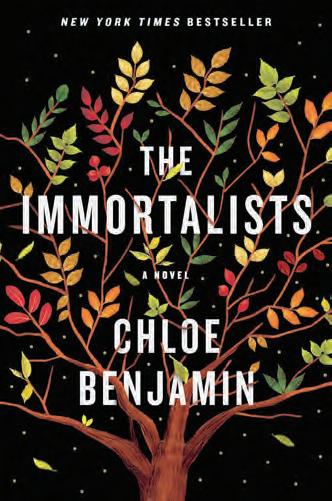










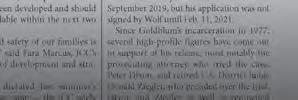
By Michael Bachner and Diana Bletter | The Times of Israel
While in captivity in Gaza last year, two Israeli teenage hostages were forced to perform sexual acts on one another, and their captors sexually abused them, according to new details from an Israeli Health Ministry report set to be presented to the United Nations.
The testimony and many other damning details are included in a report cataloging the physical, sexual and mental anguish the former abductees — some of them children — were subjected to, and the lasting effects it has had on them.
It is set to be submitted this week to Alice Edwards, the U.N.’s special rapporteur on torture and other cruel, inhuman or degrading treatment or punishment.
Compiled from the testimonies of hostages who were released under a November 2023 deal and those who were rescued by Israeli forces, the report details how they were burned and beaten, starved and humiliated, as well as how the abuse impacted their mental and physical health even long after they were freed.
It marks the first formal report by the Health Ministry about the hostages’ experiences.
However, some of the most graphic details included in a Hebrew-language copy of the report issued by the ministry were absent from the English-language version. It was unclear why there was a discrepancy or which version would end up being filed to the U.N.
While the Health Ministry did not answer a Times of Israel query on the matter on Sunday, the Ynet news site quoted an unnamed ministry source claiming the discrepancy was an “honest mistake that will be fixed before the report is filed to the UN.”
WARNING: GRAPHIC CONTENT
To protect the hostages’ identities, their names, ages and family statuses — as well as their genders, in the cases of minors — were not included.
According to the report, the terrorist captors forced two minors to perform sexual acts on one another and compelled them to take off their clothes in front of them, touched their private parts, and whipped their genitalia.
The same two former hostages also reported that “they were held bound and were beaten throughout their captivity. Signs of binding, scars, and marks consistent with trauma were found,” the report says.
“Additionally, two young children had burn marks on their lower limbs,” the report adds. “One child stated that the burns were the result of a deliberate branding with a heated object. Both the child and adults who were with him in captivity described the incident as a purposeful branding event, not an accident. It was described as an extremely traumatic experience.”

The report says that some hostages were kept for days in darkness, with their hands and feet bound, and received little food or water. They were beaten all over their bodies, and some had hair pulled out.
“One of the returned hostages described being sexually assaulted at gunpoint by a Hamas terrorist,” the report says. “On several occasions, captors forced women of all ages to undress while others, including the captors, watched. Some women reported that the captors sexually assaulted them. In addition, some women reported that they were tied to beds while their captors stared at them.”
Israel has previously presented reports and released testimonies from hostages detailing sexual abuses in captivity, which Hamas has denied.
Some former hostages have spoken publicly. Earlier this year, freed hostage Amit Soussana told The New York Times of how she was forced to perform “a sexual act” on one of her captors.
Conditions were ‘designed to torture the hostages psychologically’
A total of 251 hostages were abducted from Israel on Oct. 7, 2023, during the Hamas-led onslaught in southern Israel that killed 1,200 people.
Ninety-six of them remain in Gaza, including the bodies of at least 34 confirmed dead by the IDF. Hamas released 105 civilians during a weeklong truce in late November, 2023, and four hostages were released before that. Eight hostages have been rescued by troops alive, and the bodies of 38 hostages have also been recovered, including three mistakenly killed by the Israeli military as they tried to escape their captors.
Released hostages related to authorities that they were deliberately separated from other family members who were being held. In one case, a woman was held in complete isolation, in darkness, bound, receiving very little water and food and not getting treatment for injuries.
“The hostages were denied medical treatment for acute injuries caused during October 7 and subsequently, in addition to for untreated chronic conditions,” the document says. “Fractures, shrapnel wounds, and burns were treated inadequately, leading to complications which required additional surgeries, that could have been prevented with proper care.
“The captors also tortured those injured by performing painful procedures without anesthesia. Many hostages also suffered from untreated chronic conditions (e.g., heart failure, diabetes, hypothyroidism), leading to severe short-term medical deterioration. In one case a hostage died from untreated medical complications,” it goes on.
Captives, including children, were forced to watch videos of the Oct. 7 atrocities. Many of the terrorists who took part in the attack filmed it, including extreme acts of cruelty.
The men, meanwhile, “endured severe physical abuse, including continuous starvation, beatings, burns with galvanized iron (branding), hair-pulling, confinement in closed rooms with a limited amount of food and water, being held in isolation with hands and feet tied, and being denied access to the bathroom, which forced them to defecate on themselves.”
The report says that the captivity “was designed to torture the hostages psychologically, break their morale, and make them easier to control. Their time in captivity was
marked by intense trauma: family separation, immobilization, arbitrary and frequent transfers, and exposure to further violence.”
Some captives, the document says, “witnessed the killing of other captives, further deepening their sense of helplessness and hopelessness.
“In captivity, the hostages were often subjected to solitary confinement, poor sanitation, severe medical neglect, lack of sleep, starvation, sexual abuse, violence, threats, and brainwashing through media designed to break their spirit and make them submissive.”
Deliberate starvation and prerelease excess feeding
According to the report, “about half of the returned hostages described being deliberately starved during their captivity. They were given a poor diet, which often led to hunger that worsened over time. In addition to inadequate nutrition, they were kept in dark spaces, increasing the risk of vitamin D deficiency.”
Adult hostages lost an average of eight to 15 kilograms (18 to 33 pounds) — 10-17% of their original body weight — while among child captives there was an average loss of 10% in body weight, though in one extreme case, a girl lost as much as 18% of her weight.
The report says that as last year’s ceasefire deal approached, the captors gave the hostages more food and provided them with fresh clothes, apparently in an attempt to present their conditions as better than they were.
“Those who received excess food before returning to Israel were at risk of Refeeding
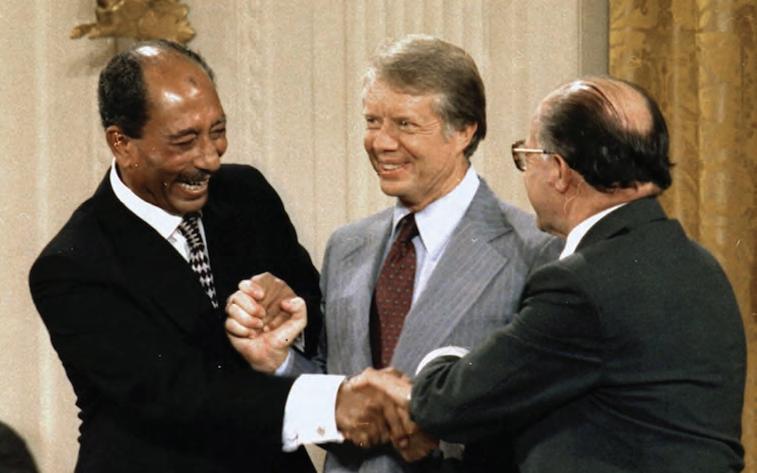
By Sarah Wildman | JTA
WASHINGTON – Jimmy Carter, the one-term president who brokered the historic Camp David Accords between Israel and Egypt but earned pariah status in some corners of the Jewish community for his criticisms of Israel, has died.
Carter, who had remained active into his final years despite a 2015 diagnosis of liver cancer, died Sunday at 100 at his home in Plains, Georgia, his nonprofit announced.
Carter’s work at Camp David in 1978 led to the first peace treaty between Israel and an Arab state and radically changed the landscape of the Middle East, diminishing — for the first time in Israel’s history — the threat of regional war. Over 13 days, Carter personally authored 23 drafts of the accord and negotiated separately with both sides after it became clear they could not reach an agreement directly.
was in shambles, and neither Begin nor Sadat seemed primed to reach the kind of agreement that would justify such an expenditure of presidential time and goodwill. But Carter’s gamble worked.
“Carter was the hero of Camp David,” said Aharon Barak, the longtime chief justice of the Israeli Supreme Court and a former chief advisor to Begin. “We were sitting I think eight or nine days together. We ate, we did a prayer, we thought of problems, and [we] would sit and sit until late late at night. Which other president of the United States would be willing to do this?”
Carter wanted the agreement to include a timetable for the end of Israeli settlements, but in the final deal the issue was set aside. In recent years, his undisguised frustration with the growth of settlements, and with the Israeli government more generally, earned him opprobrium that bordered on vitriol in the Jewish world.
Jason Kunzman, JCC President & CEO
Scott E. Seewald, JCC Board Chair Staff & Board of the JCC
Carter grew increasingly critical of Israel in the years after he left the Oval Office, culminating with the 2006 publication of his book “Palestine: Peace Not Apartheid.” While arguments over the book led some in the Jewish world to accuse the former president of antisemitism, others saw the fight as obscuring a legacy that should be heralded.
“It’s unfair not to see Carter in the full context of what he achieved,” said Stuart Eizenstat, who served as Carter’s chief domestic policy advisor and is now the State Department’s special advisor on Holocaust issues. “He should have been a heroic figure.”
In 1978, against the advice of his advisors, Carter invited Israeli Prime Minister Menachem Begin and Egyptian President Anwar Sadat to the presidential retreat in the Catoctin mountains near Washington. Carter’s approval ratings were then at an all-time low, the economy
Carter was often unsparing in his critiques of Israeli leaders, settlement policy and the continued Jewish presence in the occupied territories. Israeli Prime Minister Benjamin Netanyahu pointedly did not meet with Carter during the former president’s 2015 trip to Israel. Carter, in turn, told the press that a two-state solution was nearly out of reach as long as Netanyahu remained in power, while Hamas, the militant group regarded as a terrorist organization by the United States, was interested in peace.
But it was his 2006 book that most rankled the Jewish community. The text was widely criticized as lopsided in its assessment of the failure of peace negotiations. In no small part it was the use of the term apartheid itself, a word he later walked back and became reluctant to use in public.
“The title is to de-legitimize Israel, because if Israel is like South Africa, it doesn’t really deserve to be a democratic state,” said Abraham Foxman, then the national director
US ambassador to Israel calls Gaza famine warning ‘inaccurate,’ prompting review
Jack Lew, the U.S. ambassador to Israel, said that a humanitarian group’s report on famine conditions in northern Gaza was “outdated and inaccurate” because its population figures were incorrect, JTA reported.
The group now says it is reviewing its assessment and will release an update next month.
Lew was responding to a Dec. 23 report by the Famine Early Warning Systems Network that said, based on several factors, that “the food consumption and acute malnutrition thresholds for Famine (IPC Phase 5) have now been surpassed in North Gaza Governorate.” It warned that additional famine conditions could be met as soon as next month.
The group does not have a presence on the ground in Gaza, and Lew released a statement Dec. 24 saying the population figures cited in the report were out of date, impacting its conclusions. The report cited two population estimates — one of 65,000-75,000 people from November, and another more recent one of 10,000-15,000.
Lew claimed that the larger figure was “the basis of the report” but that the lower figure was a better estimate, citing a range of 7,000-15,000 based on Israeli and United Nations sources.
“We have worked closely with the government of Israel and the UN to provide greater
access to the North Governorate,” Lew said. “At a time when inaccurate information is causing confusion and accusations, it is irresponsible to issue a report like this. We work day and night with the UN and our Israeli partners to meet humanitarian needs — which are great — and relying on inaccurate data is irresponsible.”
Now, a notice at the top of the humanitarian group’s Gaza webpage says the report “is under further review and is expected to be re-released with updated data and analysis in January.”
Guatemalan authorities take 160 minors from extremist Lev Tahor sect after abuse allegations
Authorities in Guatemala raided the compound of Lev Tahor, an extremist Jewish sect, and removed 160 children and teenagers after allegations of abuse and human trafficking, according to JTA.
The law enforcement raid on Dec. 20 was the latest legal action against the group, which is often described as a cult. In 2022, two leaders of the sect were given 12 years in prison on charges of kidnapping children and exploiting them for sexual purposes. Earlier this year, three members of Lev Tahor were sentenced to more than 10 years in prison for child exploitation and kidnapping after abducting a pair of siblings ages 12 and 14.
The Dec. 20 operation involved almost 480 Guatemalan government personnel, who entered the compound after several minors escaped and got in contact with authorities. The raid followed multiple unsuccessful attempts to enter the compound, and also
Jan. 6, 1909 — Communist leader Moshe Sneh is born
included the arrest of a police official believed to be collaborating with Lev Tahor.
“Based on the statements of the complainants, the evidence obtained, and the medical examinations, it was possible to establish that there are forms of human trafficking against these minors, such as forced marriage, abuse, and related crimes,” Guatemalan prosecutor Nancy Paiz said, according to Reuters.
Lev Tahor is a secretive group with an estimated membership in the hundreds who observe an extremist interpretation of Jewish law.
The group places tight restrictions on its members that largely separate them from the outside world. Lev Tahor was formerly based in Israel and Canada, and its members have lived in places including the Balkans and Mexico, where police raided their compound in 2022, arresting dozens of members and taking women and children to a shelter.
Two-thirds of Palestinians want Hamas in new Gaza government, survey finds
Close to two-thirds of Palestinians in Gaza, Judea and Samaria prefer for Hamas terrorists to be part of, or even lead, a Palestinian governing body that would control the Strip after the current war with Israel concludes, according to an Arab opinion poll published in December and reported by JNS.
The Ramallah-based Arab World for Research and Development polling firm surveyed 704 Palestinian adults between Nov. 27 and Dec. 2. (The margin of error is plus or
minus 3.7 percentage points, AWRAD said.)
According to the poll, 47% of Palestinians say they would put their trust in a government of “national unity” that would include Palestinian Authority leader Mahmoud Abbas’ Fatah faction, which currently governs swaths of Judea and Samaria, as well as Hamas, the terror group that ruled Gaza until it was destroyed by the Israel Defense Forces in recent months.
Meanwhile, 17% of the surveyed Palestinians told AWRAD they favor a return to the situation in which Gaza is ruled solely by Hamas terrorists.
In Judea and Samaria, respondents showed significantly more support for Hamas than for the Western-backed P.A., with 25% expressing support for the Islamist terrorist organization, compared to just 10% for the P.A.
In June, the Palestinians’ satisfaction with Hamas’ performance in the war against Israel reached its highest point since the Oct. 7 massacre, while support for the Palestinian Authority and Fatah plummeted.
When asked by the Palestinian Center for Policy and Survey Research to rate the performance of various actors during the war, Hamas took the lead with 75% satisfaction, up five percentage points since March.
The June 12 opinion poll recorded a slight drop in support for the Hamas-led massacre. Two-thirds declared Hamas was “correct” in launching the attack, down by four percentage points compared to three months prior. PJC
— Compiled by Jarrad Saffren


Items are provided by the Center for Israel Education (israeled.org), where you can find more details.
Jan. 3, 2004 — Sharon orders 2 outposts dismantled
Prime Minister Ariel Sharon orders the IDF to remove two illegal Jewish outposts from the West Bank. The decision reflects Sharon’s shift away from total support for the settler movement.

Jan. 4, 1935 — Mosul-Haifa pipeline opens
Moshe Sneh, known for left-wing politics and resistance to British rule, is born in Poland. He leads the Haganah from 1941 to 1946. He serves in the Knesset from 1949 to 1972, mostly with the Communist Maki party.
Jan. 7, 2010 — Early Hebrew inscription is deciphered
The University of Haifa’s Gershon Galil announces that he has deciphered a pottery shard inscription found at Khirbet Qeiyafa from the 10th century B.C.E., the earliest-known Hebrew writing yet discovered.
1938.
A pipeline spanning 590 miles from Kirkuk, Iraq, to Haifa begins carrying oil from the Mosul fields to the Mediterranean Sea. Crude oil takes about 10 days to travel through the 12-inch-diameter pipe.
Jan. 5, 1996 — Phone kills Hamas bomb maker Yahya Ayyash Yahya Ayyash, who made bombs that killed more than 80 Israelis after he joined Hamas in 1992, dies in Gaza City when the Shin Bet sets off explosives in his cellphone during his weekly call to his father.
Jan. 8, 1978 — Hadassah leader Rose Halprin dies
Rose Luria Halprin, a two-time national president of Hadassah who played a key role in the construction of the Mount Scopus hospital and held top positions in the Jewish Agency, dies at age 83.
Jan. 9, 1952 — Israel accepts German reparations
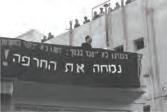
The Knesset ends three days of debate by voting 61-50 to accept more than $800 million in Holocaust reparations from the West German government over 14 years. The decision sparks protests and rioting. PJC

Top Stories:
Continued from page 1
remorse on what occurred and offers our deepest apologies. We’ve always strived to be apolitical, non-religious and supportive of diversity. We’re all in this together.”
4. Beyond ‘Bubbie,’ Jewish grandparent names get a reboot
Turns out grandmothers are still determining what to be called. This 2018 piece made its way into the top 10 reads of 2024. Whether 2025 brings grandparents new monikers or a quiet acceptance of becoming “Bubbie” is anyone’s guess. In the meantime, this piece is a reminder that long before grandparents experienced an existential reckoning, the Bard had readers pondering the same thing: “What’s in a name?”
5. Falk Lab School apologizes after ‘offensive’ Bread and Puppet performance
Next year is the year “Fraggle Rock” comes to Pittsburgh. Last year was the year when a different puppet performance incensed community members. After Bread and Puppet Theater performed “The Beginning After the End of Humanity Circus” on Oct. 3 at the Falk Laboratory School, school Director Jill Sarada called the show “highly offensive and unacceptable” and said the performance included a “number of antisemitic phrases and tropes.”
A follow-up conversation with parents, community members and school leaders was praised by Laura Cherner, director of the Jewish Federation of Greater Pittsburgh’s
Chanukah:
for one another.”
Continued from page 1
Gainey said he tries to not take anyone’s culture for granted and that he felt “blessed” to participate in different Chanukah celebrations throughout the city, as well as local Christmas and Kwanza events.
The mayor noted that the power of tradition holds special significance in the city and isn’t lost on the city’s youth.
“Look at the young people here,” he said. “The young people dictate where the tradition goes, and the young people are present today.”
Gainey’s political rival in the city’s mayoral race, Allegheny County Controller Corey O’Connor, also joined the event.
O’Connor said events like Greenfield’s Chanukah celebration are great ways to bring together the community.
The celebration, he said, provided an opportunity for the Jewish community to gather with its neighbors in a safe environment, something that’s needed in the world today.
“When you see so much antisemitism in the world, it’s great to be around people that show community,” he said. “It shows what you can accomplish when you build safe places for community today.”
City Council Member Barb Warwick addressed the work of Chabad of Greenfield and presented a proclamation declaring Dec. 29, 2024, “Chabad of Greenfield Day” in Pittsburgh.
Community Relations Council.
“To Falk’s credit, they were willing to listen about the harm and take positive steps towards repairing it,” Cherner said. “That’s the first step, to acknowledge where they went wrong, which they did, and then hearing from concerned parents.”
6. Anti-Israel graffiti, defaced image of Israel flag at PPS’ Science and Technology Academy
Inside Pittsburgh Public Schools’ Science and Technology Academy in Oakland the phrase “End Genocide” was painted on a wall. Along with the graffiti, an Israeli flag near numerous other flags was painted over with the Hebrew word “chai.” The Chronicle followed up with PPS and was told the graffitied phrase “encompasses atrocities committed against so many groups and is not just limited to antisemitism but many groups throughout history and all parts of the world — Armenia, Rwanda, Darfur — so that was handled immediately.”
As for defacing an Israeli flag, that matter was different, according to PPS, since it involved a school-sanctioned mural painted by students that was then altered. PPS said the mural was changed again and the flag was replaced.
7. Pittsburgh’s Xander Orenstein may be first out nonbinary person to hold judicial post in US
This 2021 piece made its way back to the Chronicle’s top reads of 2024. After Xander Orenstein was elected as a city magisterial judge, the Chronicle spoke with the Talmudquoting official about ending the use of cash
bails, promoting housing rights and identity. Orenstein may possibly be the first openly nonbinary person elected to a judicial seat in the U.S.
In October 2024, Orenstein faced bipartisan criticism. Some conservative lawmakers called for their impeachment because, in 2023, the judge granted a no-cash bond to a defendant who never returned to court. A little more than a year later, that defendant was charged with the murder of a liquor control enforcement agent. The controversy may have renewed interest in the Chronicle’s 2021 article about Orenstein.
8. Jewish students at Pitt’s School of Medicine face anti-Israel, antisemitic rhetoric
After a group chat between University of Pittsburgh School of Medicine students featured antisemitic rhetoric, and a public “pinning ceremony” included an antisemitic screed, university administrators told the Chronicle that efforts are underway to make Jewish students feel safer.
“While individual student conduct matters are not addressed publicly, all reports of bias incidents are taken seriously, thoroughly investigated, and appropriate steps are taken to foster an environment where every member of the Pitt community feels welcomed, safe and respected,” a statement from Pitt read.
9. Republican James Hayes looks to unseat Summer Lee this November
James Hayes, the Republican candidate for Pennsylvania’s 12th Congressional

states, works to realize the teachings and vision of the Lubavitch Rebbe Menachem Mendel Schneerson, connecting Jews of all backgrounds so they can connect to their faith, heritage and community.
“The dedication of the Chabad house and its leadership has fostered a great sense of unity, pride and spiritual connection among the Jewish residents of Greenfield, while also reaching out to the broader community with acts of kindness and compassion,” Warwick read from the proclamation.
Perhaps the loudest ovations of the night were saved for Sen. John Fetterman who addressed the crowd and lit the menorah — without a ladder.
The senator said that he was happy to be
District, challenged Rep. Summer Lee in the November election. Hayes, a political neophyte, spoke to the Chronicle about multiple issues, including his support of Israel, opposition to the BDS (boycott, divest, sanction) movement and belief in school choice. Hayes questioned the incumbent and said, “We don’t have really good representation right now.” Voters decided at the ballot box: Of the nearly 416,000 people who voted, 56% supported Lee, 43% supported Hayes.
10. Telescope building and tzedakah giving: Daniel and Carole Kamin deliver historic gift to Carnegie Museums
After Rodef Shalom congregants Daniel and Carol Kamin gave $65 million to the Carnegie Museums of Pittsburgh, Daniel Kamin offered advice to fellow landsmen on how to give tzedakah.
“First assess the areas of their interest. That’s important because there are so many possibilities and places to contribute,” he told the Chronicle. Next, prospective givers should turn to Charity Navigator, or a similar site like Charity Watch, GuideStar or ProPublica, to evaluate an organization’s vitality and credibility. Finally, after ensuring an entity operates responsibly there’s only one thing left to do: give.
“People should think through and contribute to the groups that they feel closest to,” he said. “There’s so many opportunities to help.” PJC
Adam Reinherz can be reached at areinherz@pittsburghjewishchronicle.org.
the hostages still held in Gaza. He said he will continue to talk about them and push for their return until “everyone’s brought home.”
He’s optimistic, he said, that Israel will be able to destroy Iran’s terrorist proxies.
“Everyone deserves peace and to have this finally resolved,” he said. “I’m committed to stand with Israel and that’s not going to change.”
Rabbi Yisroel Rosenfeld, executive director of Chabad of Western Pennsylvania, said Chanukah represents pride in Jewish identity.
“In today’s age, with all the challenges and difficulties, whenever it’s possible to make Jews proud, we have to do that,” he said. “This is beautiful to see.”
at the celebration for a second year and that his support for the Jewish community, both locally and in Israel, would not falter.
“I’m not going anywhere,” he said.
Fetterman told the Chronicle that he was disappointed by some of his Democratic colleagues who haven’t stood with the Jewish community or Israel, but that he would always show his support.
“If somebody invites me to be a part of a special event like this, 100% I’m going to be there,” he said. “I lean on every opportunity to stand with the Jewish community.”
Fetterman said it’s easy to lend his voice and presence to the community because, “it’s about what is right.”
The senator expressed concern, both on stage and speaking with the Chronicle, for
As to those who might be hesitant to attend Chanukah celebrations given the rise in antisemitism since Oct. 7, 2023, both in Pittsburgh and around the world, Rosenfeld said the light of the holiday provides an important function.
“I heard today from somebody who told me that he was brought back to Judaism almost 20 years ago when he saw a menorah,” he said.
Goldwasser praised the crowd size as well as those who attended the event.
“It’s a sign of support for the Jewish community,” he said. “We all have our differences, opinions and political views but the message of sharing light throughout our community and beyond, that’s something that can bring us all together.” PJC
David Rullo can be reached at drullo@ pittsburghjewishchronicle.org.
Israel:
Continued from page 4
have been rocked by pro-Palestinian protests since the war broke out when Hamas attacked Israel in October 2023. The statement noted that its activity will be carried out in cooperation with American Jewish groups and alongside similar efforts by the Diaspora Affairs Ministry.
Hamas:
Continued from page 7
Syndrome and electrolyte imbalances such as hypokalemia, hypomagnesemia, and hypophosphatemia, particularly among elderly hostages. In cases with complex medical backgrounds, these electrolyte disorders can be life-threatening,” the report says.
The practice raised concerns among Israeli authorities as to the health dangers of eating too much food immediately after a period of starvation. In particular, authorities are concerned about the fate of the remaining hostages who have now been held for over 440 days in captivity. Efforts are ongoing to finalize another, mediated cease-fire to release more hostages, and authorities are concerned their captors may also try to overfeed them before a potential release.
Troubles continue even after return
Even after returning home, some adults and children suffered acute anxiety and panic attacks, as well as sharp mood swings that include extreme depression, the report says.
“Even those who appeared strong initially
Carter:
Continued from page 8
of the Anti-Defamation League. “He’s provoking, he’s outrageous, and he’s bigoted.”
In 2009, in a letter released exclusively to JTA, Carter offered an “Al Chet” prayer of atonement for any words that may have “stigmatize[d] Israel.”
Carter was an early and fervent advocate for the rights of Soviet Jews. After Natan –then Anatoly – Sharansky was arrested in 1977, Sharanksy’s wife Avital lobbied the White House to publicly “prove” her husband was not an American spy. In an unusual move, Carter agreed to state publicly that Sharansky was not involved in espionage.
In 1978, Carter laid the groundwork for the U.S. Holocaust Memorial Museum with the creation of the Presidential Commission on the Holocaust. Chaired by Elie Wiesel, the commission recommended the establishment of a national Holocaust museum in Washington.
During the 1979 Iranian revolution, Jewish Iranians attempting to flee to the United States hit obstacles in consulates abroad. Eizenstat and White House Counsel Robert Lipschutz successfully lobbied Carter to create a special — ostensibly temporary — visa that enabled some 50,000 Iranian Jews to enter the United States after the fall of the shah. The visa status was ultimately also used by Iranian Christians and Bahais.
“Israel’s hasbara efforts and consciousness warfare have for decades not received the critical and life-saving resources and tools they require,” Saar told the Israeli newspaper Maariv. “I am determined to make a change. Every shekel devoted to this cause is an investment, not an expense, and will strengthen Israel and its standing in the world.”
Saar and his team have been holding brainstorming sessions with a wide array of individuals and groups who are involved
in pro-Israel advocacy around the world, Jewish Insider reported. Participants include social media influencers, cultural figures, professional hasbara advocates and representatives of various Jewish groups. Whatever comes of the planning, the Israeli government will attempt to improve upon its weak record of executing similar, albeit smaller advocacy initiatives in the past. Millions spent on the national effort against antisemitism and the delegitimization
“The testimonies brought here are a wake-up call to the world to put more pressure on Hamas and its supporters to release all of them [the remaining hostages] now.”
URIEL BUSO
showed difficulties adjusting to reality, sometimes experiencing dissociative episodes,” it says. “Some returned hostages had paranoid anxieties, fearing retaliation against their loved ones still in captivity if they spoke about their experiences.”
Some had difficulty leaving home or speaking above a whisper, a reflection of the silence that some were ordered to maintain by their captors. Some were unable to return to their regular lives, whether at work or school.
Former hostages have had difficulty sleeping at night, while some, in particular
children, suffer sharp pains that have no medical explanation. Some hostages have eating disorders, either eating too little or overeating. Some children secrete food away.
Some reported “severe nightmares and sleep deprivation, trying to avoid repeating nightmares. Some experienced derealization, struggling to accept their presence in the Israeli hospital as real, rather than a dream from captivity. They avoided anything that reminded them of their traumatic experiences, including certain foods,” the report says.
Many returned hostages “experience fear, restlessness, emotional detachment, and
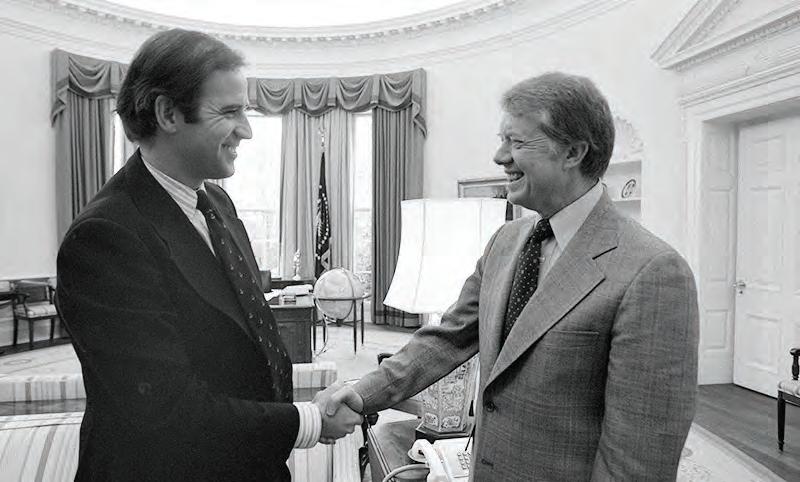
But the years of his presidency, beset by economic woes and the Iranian hostage crisis — in which 52 Americans were held by Iranian students for 444 days — took the glow from his foreign policy wins. Carter’s failure to secure reelection in 1980 is often attributed to his perceived fecklessness in Iran. In that election, Carter won only 45% of the Jewish vote, a historic low for a Democrat.
James Earl Carter, Jr. was born in Plains, “a small town in South Georgia with 683 people in it,” as Carter liked to say. Like his father before him, Carter was a peanut farmer. He married Rosalynn in 1946. The
of Israel around the world over the past decade have not produced almost any fruit in the eyes of Israeli government officials, according to reporting from investigative journalist Uri Blau in the Israeli digital outlet Shomrim.
“This activity has failed by every conceivable parameter,” Avi Cohen-Scali, the director general of the Ministry of Diaspora and Combating Antisemitism told Shomrim. PJC
confusion. Some were afraid to leave their rooms, even in the hospital’s protected areas.”
Doctors and psychologists who compiled the report noted that the released hostages said they are unable to fully recover while they know there are others still being held. Some have “survivor’s guilt,” feeling responsible for being rescued while their loved ones remain in Gaza.
Health Minister Uriel Buso said in a statement last week that it is “a significant report that depicts the atrocities that hostages suffered and reveals to the world the cruelty of the enemies we are dealing with.”
“The testimonies brought here are a wake-up call to the world to put more pressure on Hamas and its supporters to release all of them [the remaining hostages] now,” Buso said.
The Hostages and Missing Families Forum said the report painted “a grim reality of the physical abuse and psychological torment” endured by the hostages.
It urged a comprehensive deal “to secure the immediate release of all hostages.” PJC
Stuart Winer and AFP contributed to this report.
A deeply religious man, Carter was unabashed in describing his relationship with God while on the presidential campaign trail in 1976. On his first trip to Israel, in 1973, Carter asked to dip in the waters of the Jordan River. In meeting then Prime Minister Golda Meir on that same trip, he wrote in his 2006 book, he warned her that nothing good had come for the Jews when they had turned from God. The secular prime minister, he reported, was bemused.
In the 35 years since he lost his 1980 re-election bid to Ronald Reagan — the longest post-presidency in U.S. history — Carter was widely celebrated for his work on human rights, hunger reduction and the pursuit of free elections around the globe through the Carter Center, the Atlanta-based nonprofit he founded in 1982 with his wife.
couple had four children.
Carter felt quite keenly the need to address the violent racial history of the south. He did not join the White Citizens Council when he returned from eight years in the Navy. It was 1953, his father had just died and Carter was shifting gears to life on the farm. His political career began on the school board. He went on to the Georgia State Senate and eventually the governor’s mansion.
When he became governor of Georgia –also a position he would hold for only one term — he famously announced, “The time for racial discrimination is over.” He saw himself as a champion for the oppressed.
Carter’s religious commitments were part of his motivation to seek peace in the Middle East and for his post-presidential work on poverty and conflict resolution. He was a member of the Elders, a global collective of elder statesmen working on peace and human rights. In 2002, he was awarded the Nobel Peace Prize.
“In Judaism, we say ‘Kol Yisrael arevim zeh bazeh.’ (All Jews are responsible for one another),” Tamara Cofman Wittes said in a 2015 interview when she was director of the Center for Middle East Policy at the Brookings Institution. “I think for President Carter, that was a sentiment that applied to all humanity.” PJC
Our community endured another turbulent year. While Israel continued to battle Hamas in an effort to end its reign of terror and retrieve the hostages remaining in Gaza, the Jewish state also was attacked by Hezbollah, the Houthis in Yemen, terrorists in the West Bank and missiles fired directly from Iran. Meanwhile, antisemitism surged across the United States, including in Pittsburgh. It was a year filled with anxiety. But it was also one of hope.
First, the anxiety:
Throughout 2024, the Chronicle covered anti-Israeli and antisemitic incidents at Carnegie Mellon University, University of Pittsburgh and Point Park University. Those included illegal anti-Israel encampments, calls to boycott the Jewish state, anti-Israel rioters blocking the entrance to Hillel-Jewish University Center and a campaign to shut down Hillel. Two Jewish students were physically assaulted by a man wearing a keffiyeh, and another Jewish student was attacked by several men yelling slurs about Jews and Israel.
In March, Pittsburgh’s anti-Israel contingent put forth a motion at Allegheny County Council calling for a cease-fire in Gaza, laying blame for the war on the Jewish state. After more than five hours of public comment, the council rejected the motion. If passed, the resolution would have had no impact on politics in the Middle East, but it could have contributed to a climate of rising antisemitism in Allegheny County. While those who spoke in favor of the motion outnumbered those opposed by about
2 to 1, our Jewish community members who defended Israel were eloquent and passionate. We are convinced their presence at the meeting made a difference and helped persuade the council to do the right thing.
In July, Chabad of Squirrel Hill’s building and a Jewish Federation of Greater Pittsburgh sign were defaced with antisemitic graffiti, including an inverted red triangle, a symbol used by Hamas to mark its targets. Two suspects were indicted and await trial. One
Patel, a pro-Israel progressive candidate, challenged incumbent Summer Lee, who has repeatedly voted and spoken against Israel and other Jewish interests. Lee called for a cease-fire shortly after Hamas’ Oct. 7 invasion of Israel. She was one of only a few Congress members to oppose a resolution condemning Hamas after its deadly attack on Israeli civilians and has called for an arms embargo against the Jewish state as it fights its war on terror. Lee won the primary and
We don’t expect the ringing in of 2025 to magically bring enlightenment to those who would harm us. But as the secular new year begins, we see many reasons to hope.
refers to himself as a Hamas operative.
In August, our community helped defeat a referendum sponsored by the Pittsburgh Democratic Socialists of America that would have required Pittsburgh to cease doing business with any organization or individual that does business with or in Israel. PDSA withdrew the referendum after it was challenged by the Federation and City Controller Rachael Heisler, based on the invalidity of thousands of signatures gathered to put the referendum on the ballot. More than 100 community volunteers examined over 15,000 signatures to check their validity. The PDSA plans to resurrect its BDS referendum this spring.
The Chronicle provided in-depth coverage of the contentious Democratic primary for District 12’s congressional seat. Bhavini
held her seat in the general election, beating Republican James Hayes.
The Chronicle also covered our community’s opinions regarding the race between longtime Sen. Bob Casey Jr. and challenger Dave McCormick, two pro-Israel candidates, with McCormick winning the seat.
And, of course, there was the presidential election. Our readers submitted more opinion pieces and letters to the editor than we could run, many urging voters to cast their ballots based on Jewish values and love for Israel.
One could say it was a stressful year.
But here’s why we are optimistic. Our community remains strong and resilient. We came together to defeat both the proposed cease-fire resolution presented to Allegheny County and PDSA’s proposed
BDS referendum. Scores of us continue to gather regularly on the corner of Murray Avenue and Darlington Road to remember the hostages and gain inspiration from each other. Hundreds came together at the Jewish Community Center of Greater Pittsburgh in September after six hostages were murdered in Gaza. And on Oct. 7, 2024, more than 1,500 of us gathered outside the JCC, standing in solidarity with Israel and remembering the victims of Hamas’ Oct. 7, 2023, attack.
While antisemitism continues to surge on our campuses, the University of Pittsburgh took the positive step of forming a working group to confront the problem — despite some delays and pushback coming from members of the university’s Equity, Inclusion and Anti-Discrimination Advocacy Committee. We are hopeful that the new working group can bring security and relief to the school’s Jewish students and staff.
The Eradicate Hate Global Summit held its fourth annual conference in October at the David L. Lawrence Convention Center downtown. Created in response to the Pittsburgh synagogue shooting, the summit continues to be a means to galvanize worldwide action against hate.
And while progress is slow, Tree of Life broke ground on its new edifice in June, and once completed, it aims to be a place to teach and share lessons against antisemitism and other forms of bigotry.
We don’t expect the ringing in of 2025 to magically bring enlightenment to those who would harm us. But as the secular new year begins, we see many reasons for hope.
In the words of Martin Luther King Jr., “You don’t have to see the whole staircase, just take the first step.” PJC

recommended sentence under the law. Laws are crafted with such things in mind.
President Joe Biden recently commuted the sentences of 37 criminals who had been sentenced to death, changing their sentences to life in prison without parole.
For millennia, humans have sentenced criminals to death, exile or excommunication.
The purpose of such a sentence is to sever the criminal from society, to separate the person from potential new victims and from followers and acolytes whom he might influence toward committing similar crimes.
When we refer to a sentence of death as a “death penalty,” we misrepresent what it is. Death is not a punishment. One is not punished by being put to death — unless one counts the anticipation prior to the execution.
Furthermore, we don’t impose sentences for the sake of retribution or retaliation. Rather, our civil laws set forth the consequences of transgression, the parameters of what may be imposed. Neither judge nor jury is asked to decide whether the criminal is redeemable. The judgment is based on the severity of the crime relative to the
life in prison. It seemed the witnesses were trying to convince the jury that a person would be unlikely to escape. They described televisions in the cells, a new fish-keeping project, access to recreation and computers, and for those over age 50 (including our bad
Undoing the work of the justice system with the stroke of a pen seems reckless and cavalier, given the potential results.
I know very little about most of the cases of those 37. But I do know something about the other three criminals on death row whose sentences were not commuted. In particular, I know a lot about the Pittsburgh synagogue shooter, one of the three. With the exception of jury selection, I attended the entirety of his trial. I had witnessed his actions, and I testified.
During the trial, there were two witnesses for the defense who testified about the conditions of incarceration at ADX, said to be the most secure prison in the United States, the sort of place that holds those sentenced to
guy) card playing and other social activities. One witness noted that they strive to keep the prisoners happy so that they do not fight. With “good behavior,” they might gain more privileges, even to requesting a transfer to a less stringent prison.
Testimony by others indicated that our criminal enjoyed having his room and board paid for, and can comport himself with what might be considered “good behavior” in prison.
Testimony also showed that he has a history of dealing in hate online. He planned his assault in advance; it was no whim. His
only regret, a witness reported, was that he had not murdered more of us, in as messy a way as possible. Those he did murder he killed up close, some with his AR-15 against their head or neck. He stalked the building hunting for more to slaughter, stepping over his conquests. He severely wounded first responders who were thwarting his murder spree. He murdered people in the middle of prayer. He had an additional location in mind as a second target, and had enough weapons and ammunition.
All of this came out in the trial. (As an aside, I note that none of it would have been revealed had there been no trial, had he been sentenced under a plea deal to life in prison. His case would have been swept under the rug and the utter depravity never would have been brought forward.)
The criminal is now on death row in Terre Haute, Indiana, while his case is being appealed. His conditions there are not as cushy as they might be at ADX. As I understand it, he is not afforded the same communication potential, is not so much in a position to transmit his hatred and nefarious convictions to others inside or outside the prison.
Please see Glickman, page 13
Last week, the Chronicle asked its readers in an electronic poll the following question: “What is your favorite Chanukah tradition?” Of the 205 people who responded, 64% said lighting the menorah; 20% said cooking and/or eating Chanukah food; 5% said giving gifts; 1% said playing dreidel; and 10% said something else. Comments were submitted by 28 people. A few follow.
I love being with family, eating latkes and corned beef, and then lighting the candles on the menorah and passing out gifts. Everyone in my house gets something to open. We then settle down to eating donuts. We laugh and sing and have a great time!
Hands down, having latkes and trying different recipes from friends. We added potato chips last year — fabulous.
Glickman:
Continued from page 12
There are folks now who are petitioning the president, announcing that because racism may have been involved with the sentencing of some — and that some may have been wrongly convicted for other reasons — we should expunge all of their sentences. There are some who say we should free them all because we cannot continue what they call a “culture of incarceration.”
There have been hordes of citizens calling for President Biden to commute the sentences of all who are on death row, simply because those folks “do not believe in the death penalty.” The president’s commutations have undercut the work of judges, juries, prosecutors, and slews
of others in our justice system, on some blanket “belief” that what is in the law should not be there.
A more appropriate way for these citizens to address their “belief” would be to petition for a change in the law, rather than to ask the president to undo what our justice system has done under the law. Lawmakers who use their office as an activist platform should stop encouraging this circumvention and work to change the law. The law is alive. It grows, it changes with our society. But it takes action by the lawmakers.
Changing the law must not simply engender snipping out “death” from the wording. We need a law which sufficiently excommunicates the criminal from all of society, from electronics, mail, phone calls, even from visitors. We need what might be
I love making fried foods. I imagine all the menorahs across time zones, lighting candle after candle after candle, keeping the light going.
Gifts for grandkids.
As with all the holidays, both secular and traditional, family and the gathering around the table are always special.
It’s a toss-up between devouring latkes smothered in apple sauce and explaining how “our minor holiday” differs from Xmas.
I collect chanukiahs, so lighting several of them is very special to our family.
I should say lighting the menorah, but if I am being truthful it’s eating latkes.
considered a fate worse than death. Make that new law before eliminating the old, to retain what is effective.
Given President-elect Trump’s promise to “vigorously pursue” capital punishment, I understand why President Biden would consider such commutations, and perhaps why he carried them out. However, folks who believe that these criminals will be sentenced to perennial solitary confinement are mistaken.
After President Biden’s announcement, one attorney for criminals whose death sentences will be commuted was quoted by CNN saying, “We hope that brings them a connection with their families… Hopefully, they’ll have an opportunity to get into general population (an inmate group with fewer restrictions) and participate in programs and have a life.”
While lighting the candles is obviously very special, I love to cook. I started a few years ago baking a corned beef brisket and serving it as Reuben using the latkes instead of the bread. Yum!
No matter your favorite, the continuation of traditions like those practiced on Chanukah are vital to the future of the Jewish people.
Lighting the menorah was always my favorite tradition. In today’s world of such upheaval and darkness, lighting the menorah is even more special. We need light to dispel the darkness. PJC
Compiled
by Toby
Tabachnick
Chronicle weekly poll question: Overall do you think 2025 will be better or worse than 2024? Go to pittsburghjewishchronicle.org to respond. PJC
Undoing the work of the justice system with the stroke of a pen seems reckless and cavalier, given the potential results. Perhaps some have been spared an inappropriate outcome, but others will be gloating as they live out their lives in much better conditions than they had on death row.
I feel very relieved for the president’s inaction concerning the three whose sentences were not commuted. “Evil” may not be a term in civil law, but it is what I witnessed. And I am convinced that keeping that individual away from all parts of civilization is the best outcome for our country. Forever. PJC
Audrey N. Glickman is the author of POCKETS: The Problem with Society Is in Women’s Clothing (AudreyGlickman. com) and a survivor of the Pittsburgh synagogue shooting.
Although it is gratifying that three of the worst human beings on the face of the earth were not included in his order, I am sadly disappointed in President Joe Biden for commuting the death sentences of 37 killers, including mass murderers and those who slaughtered children and law enforcement officers (“Biden commutes death sentences of 37 federal prisoners — but not the Pittsburgh synagogue shooter,” Dec. 27).
The president has seized the wheels of justice from the judges and juries that concluded that under our laws, the crimes committed by those who will now serve sentences of life in prison were sufficiently serious as to justify the ultimate punishment. He has let down many of the survivors of those who were slain, heaping additional pain upon them. Mr. Biden’s action serves to diminish respect for our system of governance and our laws.
Oren Spiegler Peters Township
I was pleased to see Deborah Weisberg’s lengthy profile of Mark Rubinstein’s nonprofit, Pittsburgh Youth Leadership, in your Dec. 27 issue (“Two wheels and one mission: Jewish lawyer’s bike trips empower kids to lead”). The piece was a wonderful tribute to his impactful
work helping empower at-risk youth. However, surprisingly for a Jewish newspaper, the article did not make any mention of Mark’s leadership in the Jewish community — specifically, Congregation Dor Hadash. Mark is a past president of our congregation and has been an active lay leader for many years since. In the past year alone, he served as nominations chair, organized our Friday night speakers’ program, and emceed our 60th anniversary celebration. Since the shooting in 2018, Mark has hosted the annual “Bike Ride for Jerry” in memory of Jerry Rabinowitz, z”l. His commitment to serving others is grounded in the Jewish values that Dor Hadash exemplifies.
Rabbi Amy Bardack Congregation Dor Hadash Pittsburgh
Correction
In the recipe “Salted vanilla cream sufganyot” (Dec. 20), sugar was inadvertently omitted from the pastry cream. When preparing the cream, ½ cup of regular sugar should be added with the eggs, cornstarch and salt into the mixer; the milk is added to the mixer afterward. The Chronicle regrets the omission. PJC
We invite you to submit letters for publication. Letters must include name, address and daytime phone number; addresses and phone numbers will not be published. Letters may not exceed 500 words and may be edited for length and clarity; they cannot be returned. Send letters to: letters@pittsburghjewishchronicle.org or Pittsburgh Jewish Chronicle, 5915 Beacon St., 5th Floor, Pittsburgh, PA 15217
We regret that owing to the volume of correspondence, we cannot reply to every letter.
By Jessica Grann | Special to the Chronicle
I’m not sure exactly how to label this savory spinach side dish, but it has been the most requested vegetable dish at home. It’s like a kugel but it doesn’t have any flour or grains for filler so the recipe is grain- and gluten-free. In the past two months I’ve made this six times for Shabbat, so I’ll call it a winner. The first time I made it my husband went back for seconds, and after dinner, when I went to clean the kitchen, I noticed he had eaten almost the entire casserole. I was shocked, but also flattered, so I knew this would be a good recipe to share. You can use fresh or frozen spinach — which makes life easier — and it’s a great way to get an extra vegetable on the table that your family will devour.
This recipe calls for simple ingredients that most people have on hand. I find the basic seasonings of onion, black pepper and paprika to be incredibly comforting.
This is easy enough to make during the week, but because it heats well and tastes great both warm and at room temperature,

I like to make it for Shabbat dinner. If there are any leftovers I serve them for lunch the next day.


Ingredients Serves four
½ a large onion
2 pounds fresh spinach or 2 16-ounce bags frozen spinach
2 tablespoons oil
3 large eggs, lightly beaten
¼ cup mayonnaise
½ teaspoon salt
½ teaspoon onion powder
½ teaspoon sweet paprika
½ teaspoon coarse black pepper, plus more for the top if desired
Preheat the oven to 350 F, with the wire rack in the middle of the oven.
time to prepare and clean beforehand. I try to use fresh spinach when time allows. Either way, add 2 tablespoons of water to the spinach, which will help the fresh spinach wilt down within minutes. The water will help the frozen spinach defrost more quickly as well.
As soon as the spinach is wilted and there is no extra liquid in the bottom of the pan, remove it from the flame. Frozen spinach will have a lot more liquid that looks like green water and will take 5-10 minutes longer to cook than fresh spinach.
Add the salt, spices and mayonnaise to the spinach while it’s warm and stir well. I like using mayonnaise rather than additional oil because it makes a very creamy spinach kugel.
Lightly grease a casserole dish that is 8-inches-by-8-inches or similar in size and has sides that are 3 inches high.
Warm a sauté pan over medium-low heat for 2 minutes before adding the oil to the pan.
Warm the oil for an additional minute or so before adding the onion to oil. Sauté the onion for 12-15 minutes or until softened and lightly brown. Adjust the heat if it is browning too quickly.
Add the spinach to the pan. If you’re using fresh spinach you can fill the pan to the top; mix it into the onions and oil, and keep adding more until it’s all in the pan. Two pounds of fresh spinach seems like a lot, but it’s amazing how much spinach can cook down to nothing.
If you’re using frozen spinach it should all fit into the pan with the onions at the same time. Fresh spinach will cook faster but it takes more
Once the mayonnaise is well blended, fold in the eggs.
The mixture will look a bit runny as you pour it into your prepared casserole dish.
I love this extra peppery, so I sprinkle a bit more coarse pepper over the top.
Bake for 25-30 minutes or until the edges are brown and starting to pull away from the sides of the baking dish.
Allow to cool for 10 minutes before serving. You can cut squares from the pan, but if you run a sharp knife along the edges you can use two spatulas to lift the entire kugel out of the pan and put it on a platter if you prefer.
Enjoy and bless your hands! PJC
Jessica Grann is a home chef living in Pittsburgh.
By Jonathan Mayo | Special to the Chronicle
There are few things the Jewish community likes more than an underdog story. After all, we just celebrated a holiday that commemorates one of the biggest: the Maccabees defeating Antiochus and the Greek army.
The Pirates’ newest acquisition, Spencer Horwitz, should be welcomed with open arms as a result. He wasn’t taken until the 24th round of the 2019 Draft (today, the Draft only goes 20 rounds) out of Radford University, a school that has had a grand total of four players — including Horwitz — make it to the big leagues. He may arrive in Pittsburgh, via the trade the Pirates made with Toronto in December, as more of an established Major Leaguer who hit 12 home runs for the Blue Jays in 2024, but he’s had to prove himself at every stop, not making his Major League debut until he was 25 during the 2023 season and not getting a chance to play regularly until last year. He gets what it means to beat the odds, and has grown a deeper appreciation for how that ties into his Jewish roots lately.
“I guess it’s something I never appreciated until recently,” said Horwitz via a Zoom call held with Pittsburgh media. “With what’s going on in the world, playing for team Israel, that was an amazing experience that connected me with a lot of people. The Jewish people have always amazed me with what they’ve overcome and hopefully I can inspire others to [do the same].”
Horwitz has a tattoo on his left arm that reads “Keep going,” and that’s exactly what he’s done to get to this point, where he hopes to get most of the atbats as the Pirates’ first baseman in 2025. Growing up in the Baltimore area with a Jewish father, his parents separated when he was 12, so he wasn’t bar mitzvahed, but because of cousins, he attended plenty and he’s always felt comfortable expressing the pride he feels in being Jewish.
“I feel like that’s where I’m from,” he said. “That’s home.”
It was less prevalent when he headed to Radford, in southwest Virginia, for college ball. He heard frequently from friends and teammates that he was the first Jewish person they ever met. It didn’t take long before those who follow Jews in baseball closely recognized him as a member of the tribe, especially as he kept hitting his way up the Blue Jays’ system. Horwitz hit .307 during his pro debut after being drafted, .294 with an OPS (on base+slugging) of .862 while reaching Double-A in 2021. After a strong showing in the Arizona Fall League that autumn, he kept showing a propensity to hit and get on base, reaching Triple-A — the highest

level of the Minors — for the first time in 2022. He spent nearly all of the 2023 season with Triple-A Buffalo and had his best statistical season — a .337 average, .450 on-base percentage and .495 slugging – that led to his first call-up to the big leagues.
But before that, Horwitz got the chance to play for Team Israel in the 2023 World
Baseball Classic. When he donned the blueand-white at loanDepot park in Miami, that was the first time he played in a big league stadium, preparing him for the Major League debut to come later that season. By virtue of its win against Nicaragua, Israel qualifies for the tournament again in 2026 and Horwitz is all in to play again should the call come, noting he’s in a group chat with his Team

Israel teammates that has continued from the ’23 Classic.
If there were any Jewish baseball fans who didn’t know about Horwitz before, they certainly were aware of him then. There was a noticeable uptick in bar mitzvah and Passover seder invitations after the World Baseball Classic and, while he’s not accepted any yet, he’s keeping his DMs open.
“I’ve gotten a few direct messages on Instagram; I’ve come close to taking them up [on the offer],” Horwitz said. “There’s nothing like a good home cooked meal and being with family. Maybe I will say yes [in the future].”
Seder appearances aside, Horwitz is looking forward to getting to work and proving to the Pirates faithful he can be a major contributor. There’s already some familiarity, having played with current Pirates Jared Triolo and Alika Williams in the Cape Cod League back in 2018 and, perhaps most importantly, having worked for years with new hitting coach Matt Hague, who worked in the Blue Jays organization for the entirety of Horwitz’s pro career. It’s clear he’ll use that tattooed message as motivation.
“I’m definitely proud of where I’ve gotten to,” Horwitz said. “I wouldn’t say I’m satisfied. I have a lot more I want to accomplish in this game and hopefully I can do that in the black and gold.” PJC
Jonathan Mayo is a freelance writer living in Pittsburgh.
By Abby Sohyda | Mt. Lebanon High School
Righteous Among the Neighbors is a project of the Holocaust Center of Pittsburgh that honors non-Jewish Pittsburghers who support the Jewish community and stand up against antisemitism. In partnership with the LIGHT Education Initiative and Mt. Lebanon High School, student journalists interview honorees and write profiles about their efforts. To learn more, visit hcofpgh.org/ righteous-among-the-neighbors.
After the Oct. 27, 2018, attack on three Pittsburgh congregations, the country was astounded by the prevalence of antisemitism that still manifested itself in society 73 years after the end of World War II.
Antisemitism was the driving force that took the lives of 11 congregants and seriously wounded six others, including several police officers, in the shooting that CNN and the Anti-Defamation League classify as the most violent attack on Jewish people in American history.
The attack on Dor Hadash, New Light and Tree of Life congregations was a heartbreaking and eye-opening display of hate that fractured the hearts of not only the congregations, but the community, state and country that surrounded it. Devastation from the shooting touched the hearts of millions and led people outside of the Jewish community to stand up to hate with an incomparable fervor and kindness.
Pittsburgh resident Selina Shultz, executive director of The Conflict Lab, which provides mediation training, became a light for the community after the shooting. Her extensive experience as a lawyer and mediation expert allowed her to come to the aid of victims of the attack.
“Taking my time with people, hearing their stories — this was really my first time working with people that had experienced such a deep trauma,” Shultz said. “The ability to listen and connect with people that I learned through doing divorce mediations or mediations in organizations was really helpful.”
While Shultz’s career has taught her many mediation skills that she uses to help the community, she insists that the people she met after the Pittsburgh synagogue shooting were truly the ones helping her.
“They taught me so much,” Shultz said. “I really feel like they taught me more than I taught them.”
Since 2020, Shultz has worked with memorialization groups that allow her to harness relationships with the victims’
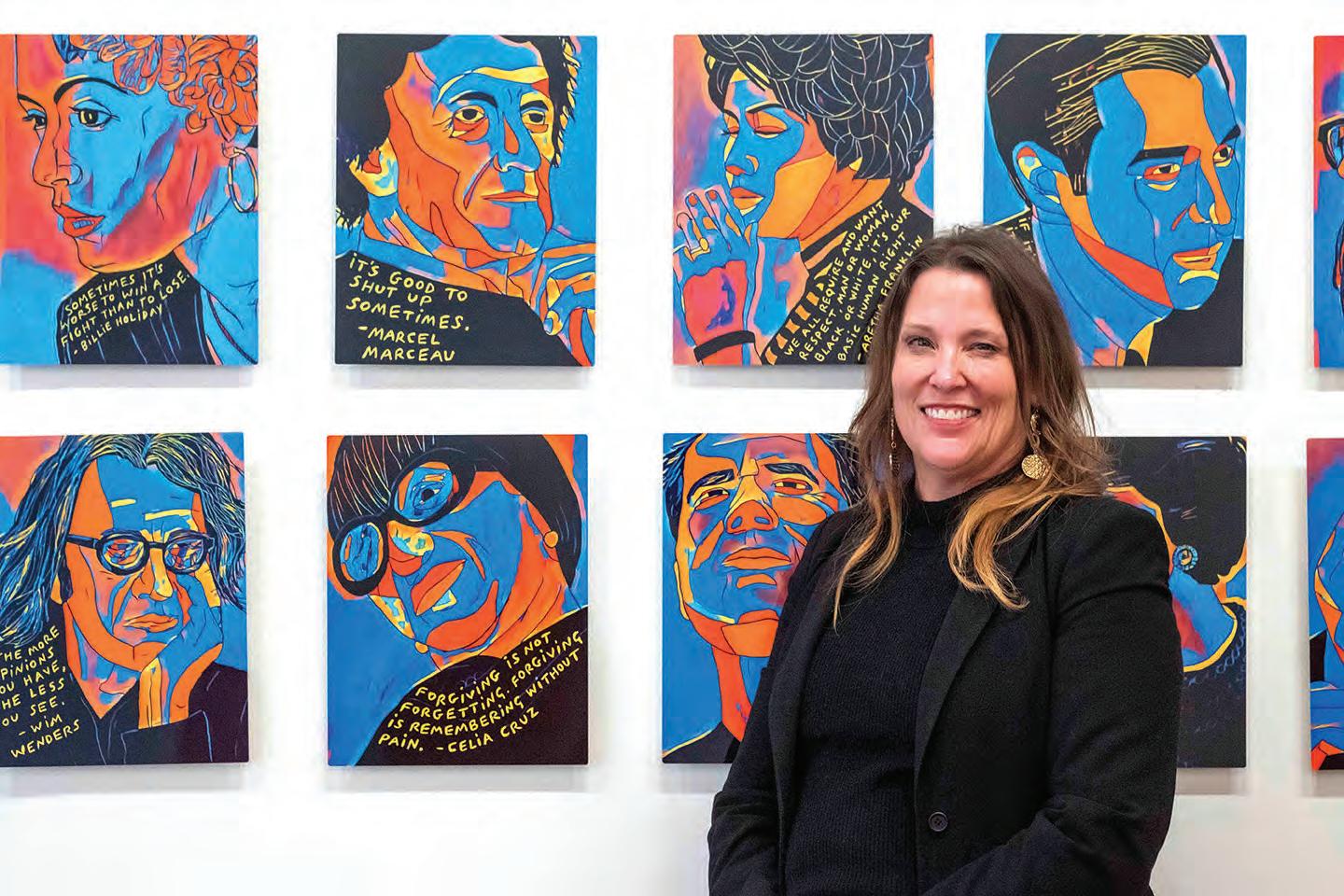
“People get stuck in conflict, they can’t reach their full potential. I want to give people the skills to navigate conflict and to stop thinking they can avoid it.”
–SELENA SHULTZ
families as well as the three congregations impacted.
Her involvement in conflict resolution was what first introduced her to the Jewish community.
“There’s a really large portion in Pittsburgh who are Jewish,” Shultz said. “That morning, I was texting my friends, so I was touched by it in that way.”
But this introduction to the Jewish community was not where Shultz stopped.
The Mediation Council gave a Conflict Resolution Day Award to the Jewish Community Center of Greater Pittsburgh, commending the organization for its ability to “pull everyone together” right after the shooting. This award led Shultz to the opportunity to work with the families and congregations affected by the shooting, allowing her to harness an intimate relationship with, and leave a positive impact on, the victims.
“I trust the process,” Shultz said. “If you
put people close to each other and open up their hearts to each other, people will be able to come to resolution. I have faith that when people are together their hearts are going to open up, they’re going to see each other, they’re going to see each other’s struggles and be able to work with each other.”
Shultz hopes her work has “been healing” and “lets people slow down.” She wants to give those she works with the ability to “step above the trauma for a moment, and be able to think about what’s important in the long run,” she said.
“People get stuck in conflict, they can’t reach their full potential,” Schultz added. “I want to give people the skills to navigate conflict and to stop thinking they can avoid it.”
Schultz insists that what she has done for the Jewish community is nothing compared to what the Jewish community has given her.
“There is such love and warmth there,” Schultz said. “I am so grateful to have
worked with these families. They are amazing people and they make me cherish my family more. They were 11 incredible people and their families are incredible. It has been a blessing to me, a huge blessing, a life-changing blessing.”
Schultz regards her work with the Jewish community and on the board of Greenpeace, a global network of organizations that work to expose global environmental problems and promote solutions, as some of her most significant accomplishments.
“It’s hard to hate close up,” Shultz said. “We need dialogue and conversations. There’s no clear answers here, and getting people to sit down and understand each other, and hear each other’s experiences — it’s dialogue, it’s never war. The only way out is dialogue. We need to understand and see the humanity in each other.” PJC
Abby Sohyda is a senior at Mt. Lebanon High School.


From ‘A Real Pain’ to ‘The Brutalist’ and beyond, Jewish movies were everywhere in 2024. What does it mean?
By Andrew Lapin | JTA
Hollywood tore itself apart after this year’s Oscars ceremony following a Jewish director’s acceptance speech for a Holocaust film, in which he criticized Israel months into its war in Gaza.
The spat over Jonathan Glazer’s “The Zone of Interest” came alongside Jewish backlash to new diversity and inclusion standards from the Academy of Motion Picture Arts and Sciences, which had neglected to include Jews as an underrepresented Hollywood group. Taken together, it might have portended a difficult Jewish year in Hollywood. Would the world of prestige cinema — with its top prize awarded by a body that recently had faced controversy for downplaying the role of Jews in the film industry’s founding — fail Jews in their time of need, like so many other cultural organizations had?
But there was a surprise at the multiplex this year. As antisemitism has spiked, debates about Israel have consumed cultural spaces and anxiety over inclusion has simmered, Jewish movies are actually having a moment.
“The Brutalist,” a historical epic about a Hungarian Jewish architect trying to succeed in postwar America, and “A Real Pain,” a modern-day dramedy about two Jewish cousins on a Holocaust tour through Poland, are two heavy favorites in this year’s Oscar race after racking up big festival prizes. The new Bob Dylan biopic “A Complete Unknown” — which includes a brief glimpse of a photo album showing the boy once known as Robert Zimmerman becoming a bar mitzvah — has earned raves for the performance of Jewish lead actor Timothee Chalamet, and landed well with mainstream audiences when it opened over Christmas.
Works focusing on Jewish clergy and religious life have also found success. This fall, “Between the Temples,” a low-budget neurotic comedy about a depressed cantor and his adult bat mitzvah student, was an indie box office hit, and Jewish supporting actress Carol Kane has become a dark-horse awards contender after a win at the New York Film Critics Circle. (Meanwhile, the small-screen romantic comedy “Nobody Wants This,” starring Adam Brody as a meme-worthy “hot rabbi” dating a non-Jewish woman, was one of the year’s most popular and buzzy TV shows.)
There’s a simple reason for these successes, entertainment industry professionals say: They’re good movies that people — both Jewish and not — want to see.
“I don’t think it’s exclusively because they are quote, unquote ‘Jewish stories,’” said Eric Kohn, a Jewish longtime film critic who currently works for a movie production company and as a programmer for a film center on Long Island. “I think it’s because they have other access points.”
And any echoes of the post-Oct. 7, 2023, Jewish experience are largely unintentional. With the exception of “A Complete Unknown,” all of this year’s big Jewish films — including “September 5,” a historical drama about

the Israeli athlete hostage crisis at the 1972 Munich Olympics games — were shot before the Hamas attack and subsequent war.
In addition, not every filmmaker explicitly set out to make a project dealing with Jewish identity. While “A Real Pain” writer-director-star Jesse Eisenberg and “Between the Temples” director Nathan Silver have been up front about their interest in Judaism as a subject, “The Brutalist” director Brady Corbet and “September 5” director Tim Fehlbaum have said their films just happen to deal with Jews or Israelis, and that their central thematic interests lay elsewhere.
The movies bear that out: Kohn noted that they have additional draws beyond the fact of their Judaism. “The Brutalist” is as much the story of an uncompromising artist, and of the broader immigrant experience, as it is about Holocaust survivors. “A Real Pain,” starring Eisenberg and Kieran Culkin, is more explicitly about Holocaust trauma. But, Kohn noted, “It’s also a buddy movie with the guy from ‘The Social Network’ and the guy from ‘Succession.’”
And a Bob Dylan movie has broad cultural resonance, particularly since the figure at its center doesn’t publicly embrace his Judaism as much as many other Jewish celebrities. Still, in a year like 2024, any Jewish inclusion — no matter how incidental — was welcomed by many.
“I liked the fact that they were movies about American Jews,” the Jewish film critic J. Hoberman, who writes frequently about Jews and cinema, said about most of the year’s Jewish offerings. “It was like a release, in a sense, to deal with the Diaspora rather than Israel.” Hoberman added that he was also a big admirer of “The Goldman Case,” a French courtroom drama based on the real-life trial of a 1970s-era Jewish radical but found a
relatively smaller audience.
(The attraction beyond Judaism also links this year’s big Jewish movies to last year’s Jewish awards darlings “Oppenheimer,” “The Zone of Interest” and “Maestro,” which similarly held non-Jewish appeal: famous-person biopics, big-budget effects spectacles and cerebral, innovative arthouse filmmaking.)
Another crucial element linking “The Brutalist,” “A Real Pain” and “Between the Temples”: They were all independent productions, financed and filmed outside of the major studios before being acquired by mid-sized to large distributors after festival premieres. Hip indie distributor A24, Disney-owned label Searchlight Pictures, and megastudio Sony wound up releasing those films, in that order; “September 5,” too, was independently financed before being acquired by Paramount. (Partially to save costs, “The Brutalist” and “A Real Pain” were respectively filmed in Hungary and Poland — the countries where their characters encountered the horrors of the Holocaust.)
As the Oscar campaigns for the Holocaustthemed selections ramp up, their distributors appear to be leaning into the movies’ universal themes, rather than their Jewish ones — a shift away from many successful Oscar campaigns for Holocaust movies of the last few decades, ranging from “Schindler’s List” to “The Pianist” and beyond, which often placed the horrors of the Holocaust in the center of their pitch to Oscar voters as an important part of bearing witness.
“ The films that we’re talking about in the best picture conversation, they’re not presenting anything related to Jewish identity that might make a non-Jewish audience uncomfortable,” Kohn said.
In addition, few of the above films tackle the subject of Israel directly (“The Brutalist” includes some late-in-the-film discussions of
Zionism, but it’s not the movie’s focus). Even “September 5,” which dramatizes the Munich hostage crisis at which 11 Israeli athletes and coaches were murdered by Palestinian terrorists, does not center the Jewish or Israeli perspective, instead focusing on the TV sports journalists tasked with covering the tragedy — though the historical parallels to today’s Israeli hostage crisis and the ensuing war in Gaza still resonate.
The film won’t be released widely until January, but it hasn’t yet broken through the cultural landscape as much as Paramount had hoped. The studio was positioning it as a potential best picture contender at the Oscars, perhaps inspired by Steven Spielberg’s 2005 drama “Munich,” which covered the same subject and received five Oscar nominations including the top one. But it’s failed to generate much buzz in limited release, harming its chances, and Oscar predictors like Variety and Vulture have knocked its odds down; Kohn called the film “a complete dud at the box office.” (It did receive a lone Golden Globe nomination for best drama.)
Whether that’s due to its focus on Israel or to general disinterest amid a crowded film marketplace isn’t clear. On the film-reviewing social network Letterboxd, some of the most popular reviews of “September 5” ding it for supposedly being “Israeli propaganda.”
The war has certainly affected at least one Jewish film this year: the documentary “No Other Land,” which was directed by a collective of Israeli and Palestinian filmmakers and chronicles the Israeli military’s efforts to demolish the Palestinian West Bank village collective of Masafer Yatta. Like the other films mentioned in this article, it was made before Oct. 7 (with a small coda that takes
Justin William Sherman is proud to announce the birth of his brother, Alexander Wyatt Sherman, on Dec. 25, 2024. The happy parents are Richard and Sreyleap Sherman of Sambor, Cambodia. Grandparents are Roz and the late Bill Sherman of Squirrel Hill. Alexander is named in memory of his paternal grandfather, William Sherman, and his paternal great-grandfather, Albert Gross. PJC
Continued from page 17
place afterwards). But the movie’s supporters frequently cite the ongoing war — and accompanying rise in settler violence in the West Bank — in arguing for wider exposure.
Despite widespread critical acclaim and awards, including recently being shortlisted for best documentary at the Oscars, “No Other Land” has yet to find an official U.S. distributor. It will receive a limited New York release in January. The filmmakers declined an interview with JTA, saying they would wait until January to do further publicity for the movie.
Another controversial Israel-focused documentary, “The Bibi Files,” was also shortlisted for the Oscar and will soon be distributed as part of a nontraditional new-media model; it is backed by the Israeli activist group UnXeptable, which protests Israeli Prime Minister Benjamin Netanyahu and his government, and has a large U.S. presence. (Notably, the Oscar shortlist for best international feature included the Palestinian submission — “From Ground Zero,” an omnibus of short films shot in Gaza after Oct. 7 — but not the Israeli one, a drama about sibling grief called “Come Closer” that did not address the war.)
“I thought it was more than a film,” Hoberman, who named ”No Other Land” the best movie of the year, told JTA. “I was really glad to have a movie that was so outspoken about what I perceive as a terrible injustice. And at the same time, the fact that it could be made was hopeful in itself, if only in a theoretical sense.” His best-of list appeared in Artforum magazine, which itself underwent an Oct. 7-prompted leadership crisis shortly after the Hamas attack.
The failure of “No Other Land” to find distribution might say more about Hollywood’s post-Oct. 7 mood than the success of other Jewish-themed movies: films
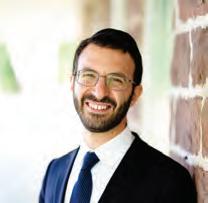
addressing the conflict are still seen as too risky for the bottom line. “No company feels like they can take the risk of the baggage that that film might bring, whether or not they agree with the perspective in it,” Kohn said.
Not every Jew is pleased with how this year’s crop of Jewish movies depicts actual Jewish life. Allison Josephs, an advocate for Jewish onscreen representation who runs the blog Jew in the City and recently undertook a survey of Jewish TV characters in collaboration with the University of Southern California’s Norman Lear Center, told JTA she believed the selections “follow the patterns of problematic Jewish films we’ve seen before” in both their casting and subject matter.
“We want to see Jews cast to play Jews, diverse casting for what Jews look like, as many of us are not white-passing. We want to see Jews taking pleasure in their heritage, being proud of their identity,” Josephs w rote. “We want to see stories beyond the Holocaust.“
For Josephs, who was also active in opposing Jewish exclusion from the Academy’s new diversity rules this year, how the makers of Jewish-related films feel about Israel is also an important factor in judging their success. “I’m googling the stars of these films and I don’t see any public support of Israel,” she wrote. “And that just adds insult to injury.” (Eisenberg has avoided discussing Israel in interviews; Guy Pearce, who plays a subtly antisemitic benefactor to Adrien Brody’s Jewish architect in “The Brutalist,” is a vocal pro-Palestinian activist who recently told Vanity Fair, “I’ve had someone say to me, ‘Let’s not forget what Hollywood is made up of. Be careful.’”)
At the end of the day, Kohn said, Jewish movies remain a niche in Hollywood. But it’s a niche that can reliably bring audiences — and one in particular — to the theater.
“My parents are liberal Zionists who went to go see ‘Between the Temples.’ And I didn’t have anything to do with that,” he said. “When they see a film that has Jewish themes, they go see it.” PJC

Judah enters into his final attempt to negotiate with Joseph for the release of Benjamin who has been caught with the viceroy’s stolen goblet. Judah argues that Jacob and the family demonstrated good faith by sending Benjamin to Egypt despite Jacob’s intense attachment to him, and if Benjamin does not return, Jacob will die. Therefore, Judah requests that he be kept in Benjamin’s stead, because Judah had promised himself — meaning his share in the World to Come — as collateral for Benjamin’s return. Judah’s desper-
David, like his forbearer Judah, possessed an overwhelming sense of duty. When David runs from Saul, Saul seeks to destroy anyone associated with David. Even Jonathan, Saul’s son, is seen as a conspirator and threatened with death for aligning with David, and Saul orders the priestly city of Nob decimated because its residents provided David with food (see Samuel I 22). David runs from place to place without respite, his prospects bleak. Yet when Evyatar, the lone survivor of Nob, appears, David exclaims, “I caused this… Stay with me and do not fear, because the one who seeks my life seeks yours.” (Samuel I 22:23-24) Even though David’s connection to the murder of the priests is only indirect, David accepts full responsibility.
Winston Churchill, speaking of the United States’ reluctant entrance into WWII, proclaimed that “the price of greatness is responsibility.”
ation is palpable when he adds one last point about his motivation: “For how can I go up to my father and the youth is not with me, lest I see the evil that will befall my father.” (44:34)
The Netziv (1816-1893) observes that even had Joseph accepted Judah’s offer and Judah stayed in Benjamin’s place, Judah would still be culpable, because Judah had agreed to bring Benjamin back (see 44:33). So, Judah’s final plea — that he stay in Benjamin’s stead — was not truly a request to fulfill his agreement; rather, despite his realization of his failure, Judah still exclaims, “lest I see the evil that will befall my father.” As he stands before Joseph, Judah perceives that his life’s ultimate purpose had suddenly eluded him, and he will be left without a portion in that World. Yet, he still accepts responsibility for Benjamin’s safety and will sacrifice everything he has left and be made a slave to Joseph to prevent his father’s pain over the loss of Benjamin. Staring failure in the face, Judah can still function with the hope of at least a hatzlah purta, minimal salvation (see Gittin 56a). For Judah, responsibility goes beyond himself. His cause is lost, but his commitment remains.

Furthermore, David is running for his life, but he welcomes another refugee and intertwines their fates. Like Judah, David shoulders responsibility even at times of vulnerability and at great personal expense, and thereby proves his worthiness of the monarchy.
Winston Churchill, speaking of the United States’ reluctant entrance into WWII, proclaimed that “the price of greatness is responsibility.” He meant that when one has the ability to affect events around them, they cannot decide to sit idly on the sidelines. For him the origin is greatness and the destination is responsibility. Yet, as we have seen in Judah and David, the trajectory can be reversed, and when responsibility is welcomed even at times of weakness, true greatness can result.
When making their decisions, Judah and David did not analyze their strengths and assets but rather their values and obligations. We cannot only ask what can be done but also what must be accomplished. PJC
Rabbi Yitzi Genack is the rabbi of Shaare Torah Congregation. This column is a service of the Vaad Harabonim of Greater Pittsburgh.





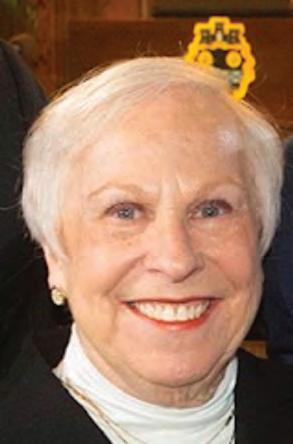
GILMAN: Barbara R. Gilman passed away surrounded by loved ones on Dec. 24, 2024. Barbara was born Feb. 26, 1944, in Detroit, Michigan. Raised in Los Angeles by the late Sara (Katzman) and Morris Weiner, she was preceded in death by her younger siblings Roberta and Chuck. She was educated at Beverly Hills High School, the University of Wisconsin and the University of Southern California, and was a special education teacher early in her life. Born to a family with a lineage of great cantors, her Jewish identity, culture, home and synagogue were always a central part of her life. She was the beloved wife of the love of her life, Fred Gilman, for over 57 years. She spent her life dedicated to her children Michelle (Rich Jasen), David (Jaime Levine), Jonathan, and Daniel (Amanda Kennedy). She was the cherished Bubbie to Annabelle, Riley, Stanton, Bodie, Sam and Tessa. In addition to the time spent as a loving wife, mom and bubbie, she was a committed volunteer at her children’s schools and to many nonprofits, including, Hillel Jewish University Center, Hebrew Free Loan, United Jewish Federation and National Council of Jewish Women. Services were held at Ralph Schugar Chapel, Inc. In lieu of flowers, the family kindly requests friends and loved ones consider making a contribution to the Hillel Jewish University Center - “Hillel: The Foundation for Jewish Campus Life” (Pittsburgh), 4607 Forbes Avenue, Pittsburgh, PA 15213, or the charity of their choice. schugar.com
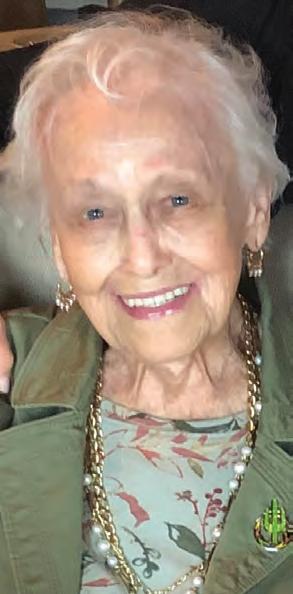
KOLODNY: Mrs. Mary Kolodny, neé Schwartz, a”h, beloved wife for 61 years of the late Max Kolodny, mother of Beverly Siegel (Dr. Howard Rieger) and Judy Meyerhoff (late Michael), and mother-in-law of the late Dr. Gary Siegel. Grandmother of eight, great-grandmother of 26 and great-great-grandmother of three. Funeral, Chicago Jewish Funerals, Monday, Dec. 30.

Contact the Development department at 412-586-2690 or development@jaapgh.org for more information. THIS WEEK’S YAHRZEITS —
Sunday January 5: Anna Arnowitz, Freda Blumenfeld, Dora Cole, Anna Sanes Cukerbaum, Esther Davis,
Caroline Falk, Theodore Gold, Abe Goldstein, Josephine Levine Gottlieb, Ada Hilsenrath, Anna Hinkes, Harry Kellman, Harry Klatman, Josiah Drotman Lazar, Harry Levinson, Samuel Mandelblatt, Abe Mullen, Sadie Segal, Jennie Shaffer, Tillie Simon, Louis B Supowitz, Jeffrey S Weiss, William Zeidenstein
Monday January 6: Berul Amstey, Fannie Berner, Florence G Davidson, Joseph Goldhammer, Ethel J Greenberg, Helene Tumpson Horewitz, Albert Marcus, David Miller, Edwin L Miller, Fannie Pecarsky, Fannie Robinson, Maida Rothaus, Esther Levy Shapiro, Meyer M Snyder, Matthew Teplitz, Ida Sack Tobias, David Weinberger, Morris Wolf
Tuesday January 7: Bess B Aberman, Abraham Boodman, Henry E Green, Esther Ruth Karpo, Joberta Kreimer Goldman, David Labowitz, Reuben B Lando, Charlotte Love, Anna Miller, Laura Roth Miller, Jerome Myers, Samuel Roth, Samuel Shaffer, Edward H Talenfeld
Wednesday January 8: Mollie Gilberd, Ida L Gusky, Israel Herring, Eva Katz, Rose Levine, Lib H Levy, Stanley Myles Perilman, Milton Henry Platt, Elsie Wintner Rosenberg, Celia Siff, M Alan Slone, Minnie Stein
Thursday January 9: Izzy Brown, Lepke Brown, Florence Burechson, Linda Elmaleh, Joseph L Friedman, Anne B Goldston, Harry Gordon, Fred Gottesman, Freda Halpert Gross, Irvin Grossman, William M Kahanowitz, Bessie Levine, Joseph A Mervis, Bessie Recht, Max Selkovits, Joseph Sigal, Harold Sylvan Soltman
Friday January 10: Herbert Burechson, Nelson Carl Cotlov, Sylvia S Cramer, Lena Diznoff, Fanny R Goldstein, Jerome S Goldstein, Jonathan Daniel Haber, Louis S Klee, Seymour Kramer, Leah Krauss Lenchner, Simon Linton, Anita Middleman, Nathan A Pearlman, Abe Robin, Esther Rothman, Anna Ruben, Edward F Stein, Estelle Strauss, Eleanor Lee Swartz, Harry Tannenbaum, Rose Weinberger
Saturday January 11: Minerva Aschkenas, Rose Fruhlinger Berger, Joseph M Cohen, Avrom Dobkin, Miriam L Gallow, Harry Green, Max Greenberg, Rose Kalser, Harry Kaufman, Benjamin Knina, Edgar Landerman, Louis Levin, Jack I Mallinger, Esther Marks, Helen Rosenbloom, Louis Silverblatt, Florence Silverman
KRAMER: Edith Z. Kramer passed away in her home on Sunday, Dec. 22, 2024. She was 89 years old. Born in Pittsburgh to Harry and Ruth (née Friedman) Zeligman, she resided in Pittsburgh and Altoona, Pennsylvania, prior to settling in New Jersey. She was an elementary school teacher for the Pittsburgh and Altoona Public Schools and also taught in the Elizabeth, New Jersey, Public Schools. She was an avid reader and devoted mother whose baking was treasured by her family. Edith was predeceased by her husband, Byron Kramer, in 2009. Surviving are her daughter, Nancy (Dr. David) Young of Monroe Township; her son, Dr. Marc R. Kramer of Scottsdale, Arizona; her two grandchildren, Brittany and Lindsey; and three great-grandchildren, Brooklyn, Devin and Eli. Funeral services were entrusted to Mount Sinai Memorial Chapels, East Brunswick, NJ. To leave a message of condolence, please visit MSMC.us.
LINDNER: Ruth Linder, on Dec. 27, 2024. Beloved wife of the late Allen “Elly” Lindner. Loving mother of Martin (Kim) Lindner and Jay (Pam) Lindner. Cherished sister of the late
Please see Obituaries,
Jeffrey Lewis Landerman, Deceased December 23, 2023, of Pittsburgh, Pennsylvania No. 02-24-01279
Michelle Landerman, Administrator; 1649 Jamestown Place, Pittsburgh, PA 15235
or to Bruce S. Gelman, Esquire, Gelman & Reisman, P.C., Law & Finance Bldg., 429 Fourth Avenue, Suite 1701, Pittsburgh, PA 15219
Sandra Estelle Snyder a/k/a Sandra E. Snyder, Deceased November 9, 2024, of Pittsburgh, Pennsylvania No. 02-24-07538
Andrea A. Friedenberg, Executrix; 1009 Flemington Street, Pittsburgh, PA 15217 or to Bruce S. Gelman, Esquire, Gelman & Reisman, P.C., Law & Finance Bldg., 429 Fourth Avenue, Suite 1701, Pittsburgh, PA 15219














The Jewish Cemetery & Burial Association of Greater Pittsburgh (JCBA) is a rapidly growing non-profit organization dedicated to maintaining the dignity, preservation, and respect for Jewish cemeteries across the Greater Pittsburgh area.
Position Summary:
The Operations Coordinator will play a critical role in the day-to-day operations of the JCBA, supporting the Operations Manager in overseeing cemetery maintenance, burial scheduling, record-keeping, and community relations. This position requires excellent organizational skills, technology expertise, attention to detail, and a commitment to providing respectful and professional service.
Responsibilities:
Operations Support:
• Coordinate daily cemetery operations, including burial scheduling, site preparation, and maintenance activities.
• Maintain accurate burial and cemetery records, ensuring compliance with internal policies and legal requirements.
• Collaborate with groundskeeping staff to ensure the cemeteries are maintained to a high standard, including landscaping, grave marking, and signage.
• Support the Operations Manager in developing and updating operational procedures to enhance efficiency and service quality.
Customer Service:
• Serve as a point of contact (intake for all JCBA calls) for families and funeral homes, handling inquiries with empathy and sensitivity.
• Provide compassionate assistance to grieving families, ensuring all requests are handled respectfully and promptly.
Administrative Duties:
• Manage cemetery databases, ensuring accurate and timely input of all burial and plot information.
• Assist with billing and financial record-keeping in coordination with the Operations Manager and accounting team.
• Facilitate all work orders between families and cemetery caretakers.
Project Support:
• Assist with special projects as assigned by the Operations Manager, and/or Executive Director including cemetery restoration initiatives, events, community education and outreach and volunteer coordination.
• Provide logistical support for cemetery tours, educational events, and community outreach efforts.
Qualifications:
• Experience: 2+ years of experience in operations coordination, administrative support, or customer service.
Experience in a cemetery, funeral home, or religious institution setting is a plus.
Education: Associate or bachelor’s degree in business administration, operations management, or a related field preferred.
Required Skills/Experience:
• Proficiency in MS Office Suite (Word, Excel, Outlook, PowerPoint); video meeting platforms (Zoom, Teams); project management software (Airtable or Monday.com); and database management software. Experience with cemetery management software is a plus. Must be comfortable and able to learn new software and troubleshoot digital issues.
• Strong organizational and time-management skills, with an ability to handle multiple tasks efficiently.
• Excellent communication and interpersonal skills, with a compassionate and respectful approach.
• Knowledge of or willingness to learn Jewish burial customs and practices.
Work Environment:
• Must be comfortable working in outdoor settings and prepared to occasionally work on weekends or holidays as needed to accommodate burial services.
• Physical ability to walk (steep hills/stairs) in cemetery settings (all weather), bending, and light lifting is required.
Benefits:
• Competitive salary and benefits package, including health, dental, and vision insurance, mileage reimbursement, and paid time off.
How to Apply:
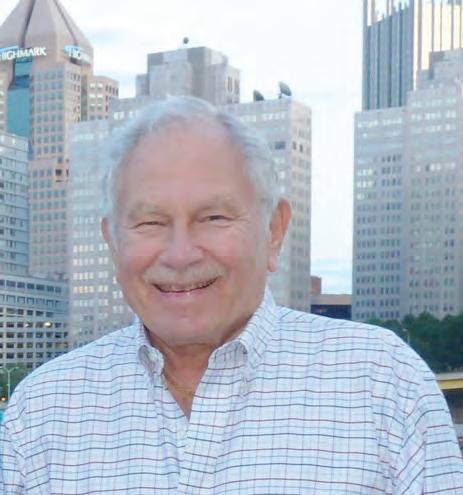
Interested candidates should submit a resume including salary requirements and cover letter detailing their experience and interest in the position to: resumes81863@gmail.com or by mailing to JCBA, P.O Box 81863, Pittsburgh, PA 15217.



For more information about JCBA cemeteries, plot purchases, to volunteer, to read our complete histories and/or to make a contribution, please visit our website at www.JCBApgh.org, email us at o ice@jcbapgh.org, or call the JCBA o ice at 412-553-6469.
JCBA’sexpanded vision is made possible by a generous grant from the Jewish Federation of Greater Pittsburgh Jewish Community Foundation





“Don’t be pushed by your problems; be led by your dreams.”







Continued from page 19
Leonard (late Vida) Hirschfield. Grandmother of Elly and Anna. Services and interment private. Contributions may be made to Family House, 5308 Liberty Avenue, Pittsburgh, PA 15224. Arrangements entrusted to Ralph Schugar Chapel, Inc. schugar.com
: Richard Rubinstein, our beloved father and grandfather, has passed away peacefully and stoically, Dec. 28, 2024, just shy of his 90th Dedicated to his family, it was only fitting that his last words were, “Where’s the baby?” referring to his 2-year-old grandson. Richard was born on Feb. 4, 1935, to the late David and Harriet Rubinstein of McKeesport, Pennsylvania. He was a graduate of Penn State, received a master’s degree from the University of Pittsburgh and served in the Air Force. One day he eyed Judy, a teenage redhead beauty from Brentwood. It took a couple years of maneuvering to corral her, but Richard eventually married his prize when she reached the ripe old age of 19. That was 66 years ago. Life for the young couple was full and rich and exciting; Richard and Judy became the parents of three children while still in their 20s. Richard built his business and owned shoe stores in Eastland Mall, McKeesport and Greengate. More recently he founded Footloose in Shadyside and the Galleria in Mt. Lebanon. The young family moved to Churchill in 1970. There were challenges, but our dear father and grandfather Richard always stood tall, strong, steady and decent. Richard was well-rounded; he played the piano, loved classical music, sang in the glee club, was a jazz aficionado and loved tennis. He was vice president of Temple B’nai Israel, president of McKeesport Symphony, and a lifelong supporter of the Pittsburgh Symphony Orchestra, the Pittsburgh Opera, MCG Jazz, Pittsburgh Arts and Lecture Series, and the Y Music Society. Hopefully he is now watching over us, smiling with his vodka in hand, as we unfold the road map he provided, living on with purpose and joie de vivre... . Richard is survived by his wife Judith; children Michael, Robert (Barb) and Jill (David); sister Beth (David) Hart of Chicago; brother-in-law Gerald Rubenstein (Marcia); grandchildren Gabrielle, Mika, Maya and Emma Rubinstein, Jacob and Sarah Cohen and Jayme Spiece; and many nieces and nephews. Services and visitation were held at Ralph Schugar Chapel, Inc. Interment at Temple B’nai Israel Cemetery. Contributions may be sent to charity of donor’s choice. schugar.com
SNYDER: Sandra “Sandy” Snyder, of Squirrel Hill, passed away peacefully on Saturday, Nov. 9 at the age of 88, after a courageous battle with ovarian cancer. Sandy was the beloved wife of the late Chuck Snyder and is survived by her loving children Andrea (Alan) Friedenberg of Israel and Howard Snyder of Pittsburgh. Proud grandmother to Elisheva Friedenberg, Shayna (Moshe) Kwiat and Penina Friedenberg, all of Israel, as well as many nephews and nieces. Sandy loved to garden, knit and go to movies. She enjoyed visiting Israel many times and loved spending time with her grandchildren while there. She stayed active throughout her cancer journey, and enjoyed spending time with friends who considered her their adopted grandmother. Sandy will be missed dearly by all who knew her. The family extends their deepest appreciation and thanks to everyone involved in her care, especially the Division of Gynecologic Oncology at Magee-Womens Hospital and the care team at Family Hospice at Canterbury House. Graveside service and interment were held at Beth Abraham Congregation Cemetery. Funeral arrangements by Gesher Hachaim Jewish Burial Society. Donations in Sandy’s memory may be made to a charity of your choice, or to Gesher Hachaim Jewish Burial Society, 2303 Murray Avenue, Pittsburgh, PA 15217.
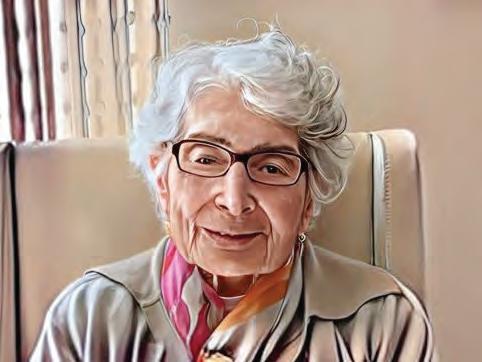

WEINBAUM: Claire Marion Lebovitz Weinbaum. On Dec. 25, 2024, Claire passed away peacefully at home. Beloved wife of the late Morris Weinbaum for 73 years; loving mother of David (Joan Weinbaum, Judy (Jon) Eakin, and the late Stuart D. Weinbaum. Claire was predeceased by three brothers and their wives: Sidney (Shirley), Joe (June) and Allen (Beverly) Lebovitz. Claire was a wonderful grandmother to Matthew (Julie), Bradley (Melissa) and Peter, and was fortunate to enjoy her role as greatgrandmother to Libby, Noah, Nora and Miles. Her memory will also be cherished by many nieces, nephews, grandnieces and nephews. Claire was born in Pitcairn on Nov. 9, 1925, to Julius and Grace Lebovitz. She attended Penn State University for one year before returning to Pittsburgh to finish her education at the University of Pittsburgh, where she made lifelong friends. She was founder and president of a juvenile diabetes organization. Graveside services and interment were held at Beth Shalom Cemetery. Contributions may be made in Claire’s memory to the Juvenile Diabetes Research Foundation of New York, New York, or a charity of your choice. Arrangements entrusted to Ralph Schugar Chapel, Inc. schugar.com PJC

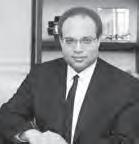





Smith-Rosenthal Team
Jason A. Smith & Caryn Rosenthal Jason: 412-969-2930 | Caryn: 412-389-1695 Jasonasmith@howardhanna.com Carynrosenthal@howardhanna.com




home,findingaspace thatbetterfitsyour needs,orsellingyour currenthome,I’m heretoguideyou everystepoftheway.
















































By Renee Ghert-Zand | The Times of Israel
As far as author and researcher Genie Milgrom knows, her recently published “Salsa! A Cuban Kosher Cookbook” is the only cookbook that teaches people how to make authentic Cuban food according to kosher dietary laws.
For Milgrom, adapting the treif, heavily pork-and shellfish-based cuisine to make it accessible to religiously observant Jews was a decades-long trial and error process. The Miami-based Milgrom stuck with the effort for personal reasons.
An Orthodox Jew since the 1980s, she was born into a devout Catholic family in Havana. For Milgrom, these Cuban dishes are her comfort food and represent her strong ties to her family and culture of origin. She had to find a way to keep cooking and eating them.
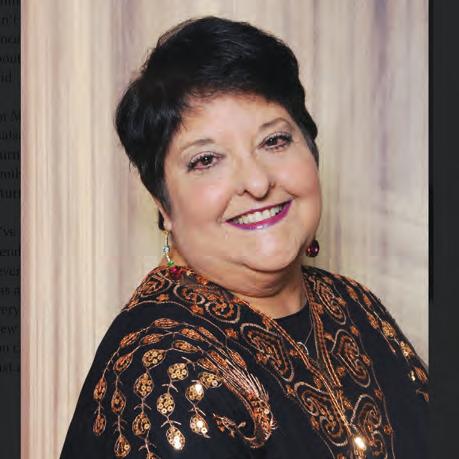
[afternoon nap],” she said.
“I was trying to say something specific about Cuban food in the title of my cookbook, ‘Salsa!’ This is not salsa, like Mexican salsa and chips. By ‘salsa,’ I mean the Cuban dance of salsa. That is the essence, spirit, and joy of the Cuban people no matter where we are,” Milgrom said.
Milgrom was born in Havana. When she was a young child, her family fled to Miami after the Cuban Revolution and Communist dictator Fidel Castro’s rise to power in 1959.
In the United States, her family regularly cooked Spanish-Cuban foods that connected them to their roots. They brought over their recipes for dishes such as seafood salad, paella, Cuban crab tamales, and shredded roast beef with bacon marinated in sour orange juice.
All these comfort foods became problematic for Milgrom when she started keeping kosher, converted to Judaism, and married an Orthodox man. She wondered if she would ever again be able to cook what she calls her “old heimishe [homey] recipes.”
Over the years, Milgrom figured out how to adjust most recipes to recreate the culinary tastes, textures, and aromas she grew up with — only now in versions with kosher-only ingredients and cooking methods. She eventually arrived at the point where she felt ready to share her recipes with others by writing and publishing her cookbook.
The first thing Milgrom points out is that Cuban food is distinctive and should not be lumped in with the cuisine of other Caribbean islands.
“Cuban cooking is Spanish cooking that incorporates many New World, local Cuban flavors. This means using a lot of native tropical fruits like papaya, coconut, guava, and chayote. The cuisine also uses lots of rum. You won’t see much use of other spirits or even wine,” Milgrom explained.
“Cuban food has a lot of layers of flavor, but it is not spicy like the food of other Caribbean islands. What’s the point of eating spicy food in a hot climate when it will just make you feel hotter? Our cuisine is very tomato-y and has many sauces and stews. I remember even from my earliest years that the stews were served in the middle of the day before the siesta
Readers may recognize a few recipes from Milgrom’s first cookbook, “Recipes Of My 15 Grandmothers.” However, the books are very different. The first, published in 2019, is based on a treasure trove of recipes from 15 generations of Milgrom’s crypto-Jewish grandmothers going back to the Inquisition that she found stashed away in her mother’s kitchen.
Those recipes reflect Milgrom’s ancestors’ journeys from Spain to the New World. Her mother’s side migrated from Spain to Portugal and then to Cuba. Milgrom’s father’s side moved from Spain to the Canary Islands to Colombia to Costa Rica, with only several family members eventually continuing to Cuba.
For the dishes for this new cookbook, Milgrom needed to look no further than the ones her grandparents and parents cooked for her in Havana and Miami. She was also inspired by a cookbook she said almost every Cuban who likes to cook — in Cuba or the Cuban diaspora — owned.
“The book is ‘Cocina Cubano’ [Typical Cuban Cooking] by Nitza Villapol. She had a daily television cooking show called ‘Cocina al Minuto’ (Cooking at the Minute). It was on every day for 45 years,” Milgrom said.
“Every woman among my Cuban friends received a copy of Villapol’s cookbook on her wedding day. I got a copy from my grandmother as a gift for my first marriage [to a non-Jewish man]. I learned by this book, this book taught me. Its pages are dog-eared and greasy. When I found that stash of recipes my mother had, I also found her copy of this cookbook. Hers was an earlier edition printed in Cuba, while mine was printed in the US,” she said.
According to Milgrom, there were several significant obstacles to making the recipes kosher.
“I was looking to cook these recipes, but it was impossible. Everything had ham. Everything had shellfish in it,” she said.
“More difficult than anything was the meat cuts. I used to buy my meat at the Cuban butcher down the street. Suddenly, I find myself standing before a kosher butcher, and I can only buy kosher cuts of meat. Kosher cuts are a lot tougher. For instance, I used to get a thin pepper steak at the Cuban butcher. I’d throw it in a frying pan, and it would cut like butter. With the kosher meat, I would throw what they


called a ‘pepper steak’ onto the frying pan, and it was like shoe leather,” she noted.
Although Milgrom had been slowly perfecting her recipes, it wasn’t until the COVID-19 pandemic in 2020-2021 and prolonged lockdowns that she had the time to write “Salsa!” While stuck at home, she asked friends and colleagues to test the recipes. She especially sought feedback from Cuban friends who were familiar with the original non-kosher versions. (Full disclosure: Milgrom asked this reporter to test her recipe for vegan frijoles negro [black beans]. They were delicious.)
Milgrom prefaces each recipe with a paragraph on the dish’s history, how or when it is eaten, or its role in her family’s history. The cookbook begins with a helpful section called “It’s All About the Ingredients.” Here, the reader will find important tips. Among them is an explanation for why most fish recipes call for snapper. This is because it is the most common fresh fish used in Cuban cooking (substitutes are permissible if they are not heavy-flesh fish such as tuna).
In this section, Milgrom explains how she made kosher substitutions. For instance, she used pre-packaged smoked turkey legs or thighs when recipes called for pork. Although the turkey had a similar consistency to ham, it was saltier, so she adjusted accordingly.
Another interesting note is that although it may seem counterintuitive to some palates, the book contains recipes that use raisins and green olives in the same dish, giving a sweet and salty flavor. Milgrom admits this combination may not be to everyone’s liking, yet encourages readers to try it.
Unfortunately, other combinations were not possible in a kosher cookbook. Milgrom provides a fish/pareve (neither dairy nor meat) recipe for paella. It has fish and imitation crab, shrimp, and scallops. This is a far cry from the original dish containing fish, a variety of shellfish, and non-kosher seafood, chicken, and pork.
“I was sad about not being able to adapt the recipe fully, but not only were there so many non-kosher ingredients, but the original dish also involves cooking and eating meat and fish together — something that Orthodox Jews do not do,” Milgrom said.
She assured readers that they can access ingredients for her recipes wherever they live.
“Many of these items are available in ethnic
food shops or markets if you can’t find them at your regular grocery store. And you can get just about anything on Amazon,” she said.
For Milgrom, the publication of “Salsa!” is another step in her journey of integrating the life and family she was born into with her return and conversion to Judaism.
“I’ve always been looking for ways to blend my past with my present…I never thought that closing the door was a good idea. I think it alienates everything you are, the essence you grew up to be. There’s no reason why you cannot be a traditional Jewish person and embrace your [non-Jewish] past as well as you can,” Milgrom said.
“My having found a way to keep cooking Cuban food has brought me a kind of comfort and ongoing connection to my parents, who are now gone. I cook just about everything, but honestly, I can’t get into a piece of gefilte fish like I do a snapper,” she said.
2 pounds ground beef
2 tablespoons onion powder
2 teaspoons black pepper
1 tablespoon crushed garlic
½ cup cornflake or bread crumbs
1 egg
1 teaspoon hot sauce
6 large olives crushed and cut into quarters
4 tablespoons dark raisins
Fried potato cubes optional to mix into the picadillo when finished.
Sofrito mixture:
½ cup diced onions
½ cup diced green peppers
¼ cup diced garlic
6 tablespoons extra virgin olive oil
The sofrito mixture should be made first. Sauté the onions, green pepper and garlic until the onions are transparent. Set aside. Mix all ingredients together by hand except the olives and the raisins. Put into the saucepan with the sofrito mixture and cook while stirring all the time to make sure there are no clumps in the meat. Add the olives and raisins and simmer for 20 minutes.
This can be eaten inside empanadas or over white rice with sweet plantains on the side. PJC
Sounds like a Chanukah-Shabbat mashup
Miss Lena, an Early Childhood Development Center parent, performed Shabbat and Chanukah favorites, while helping students, teachers and family welcome Shabbat at the Jewish Community Center in Squirrel Hill.

Fried foods and Cranberry
Chabad Jewish Center of Cranberry welcomed local residents for a festive Chanukah dinner.
and news

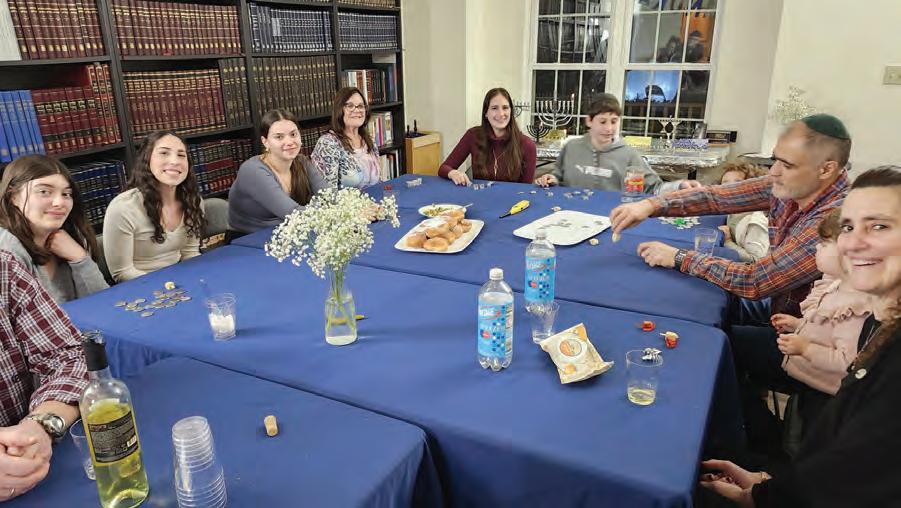


Before beginning winter break, Community Day School students and staff
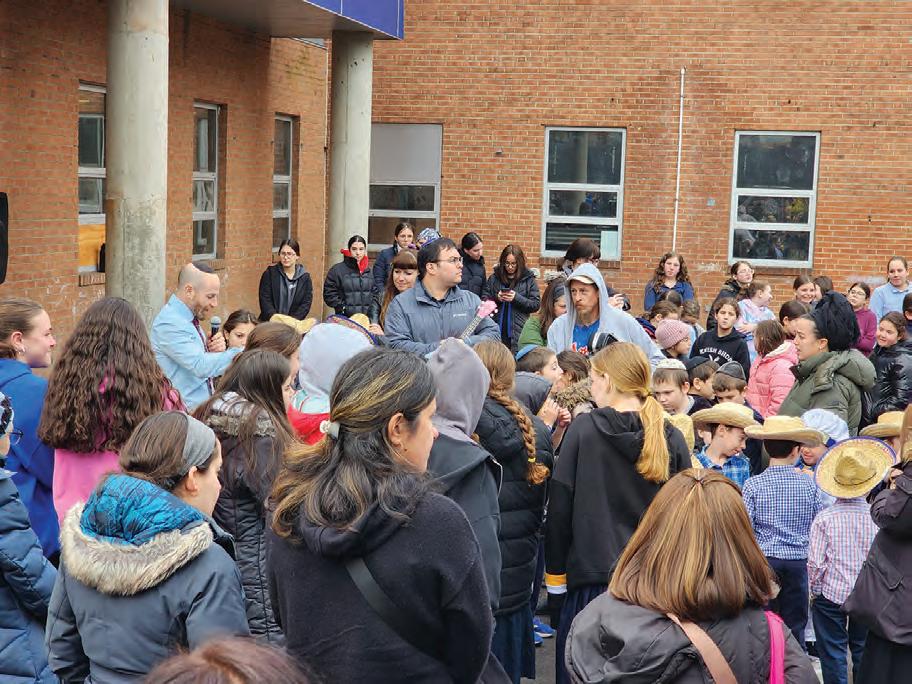
• Record-breaking dining and drinks
• Crowd-pleasing live music, dancing and entertainment
• Win-win Ra e: $15,000 A&L Motors gift certificate toward purchase or lease on a new BMW, Jaguar or Land Rover
• Go -for-the-gold luxury auction
Come as a team, rep your favorite athlete or wear your party-all-night uniform
Tickets: $150 at bit.ly/bignight25
JCC Olympic Stadium
5738 Forbes Avenue • Squirrel Hill
Valet Parking
Terrina and Dan LaVallee
Lisa and Jonathan Marcus
Natalie and Brian Valen
